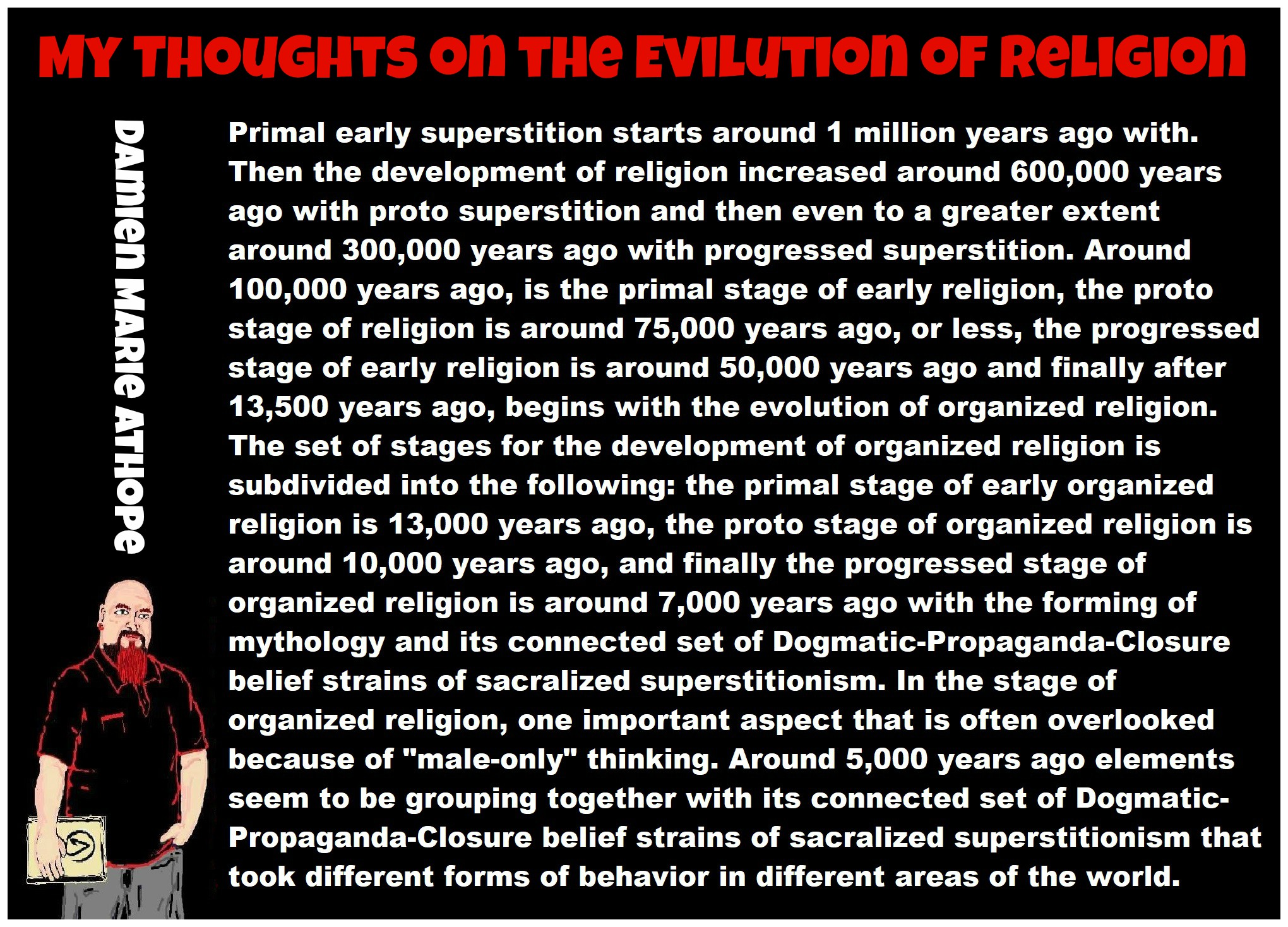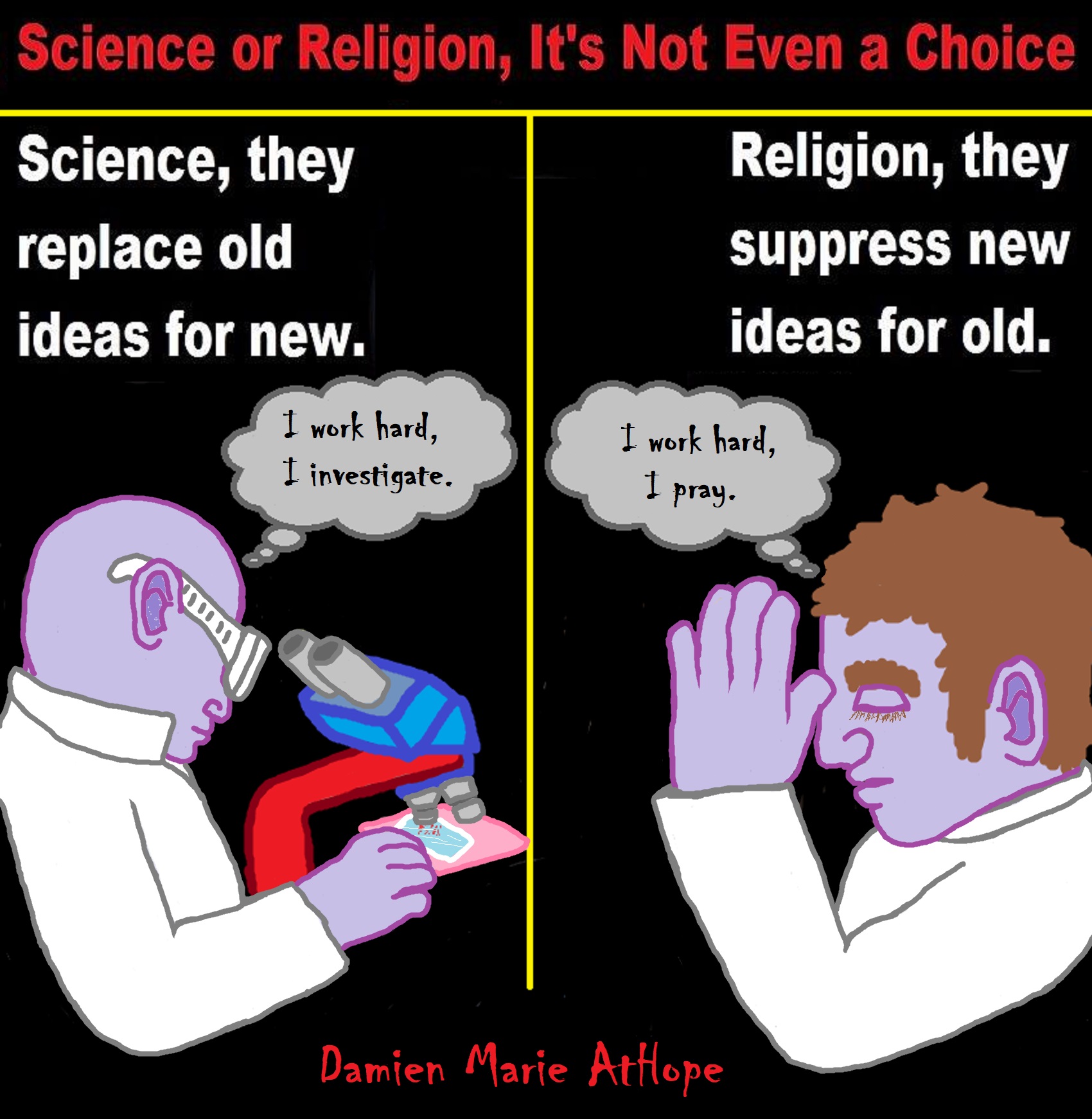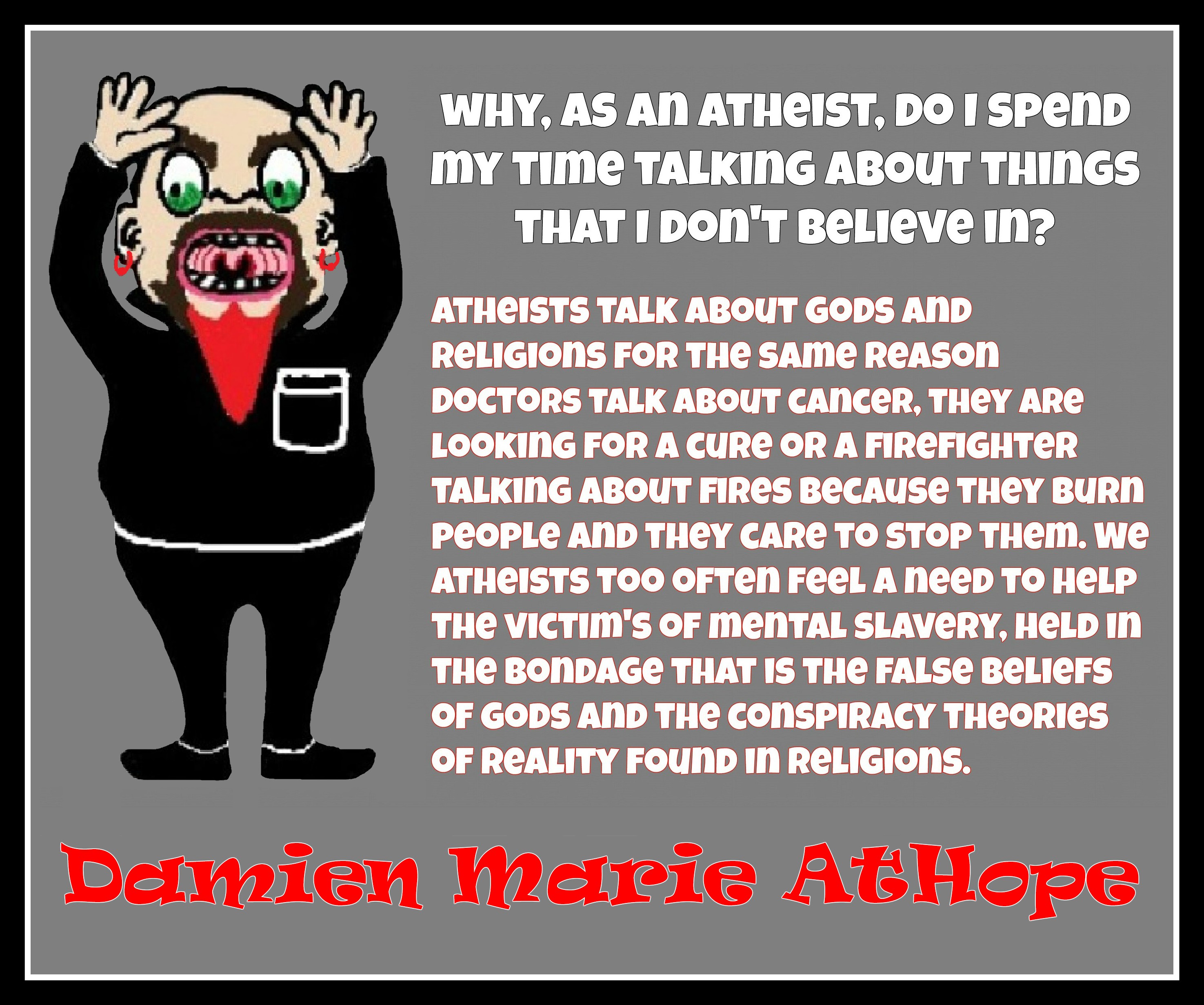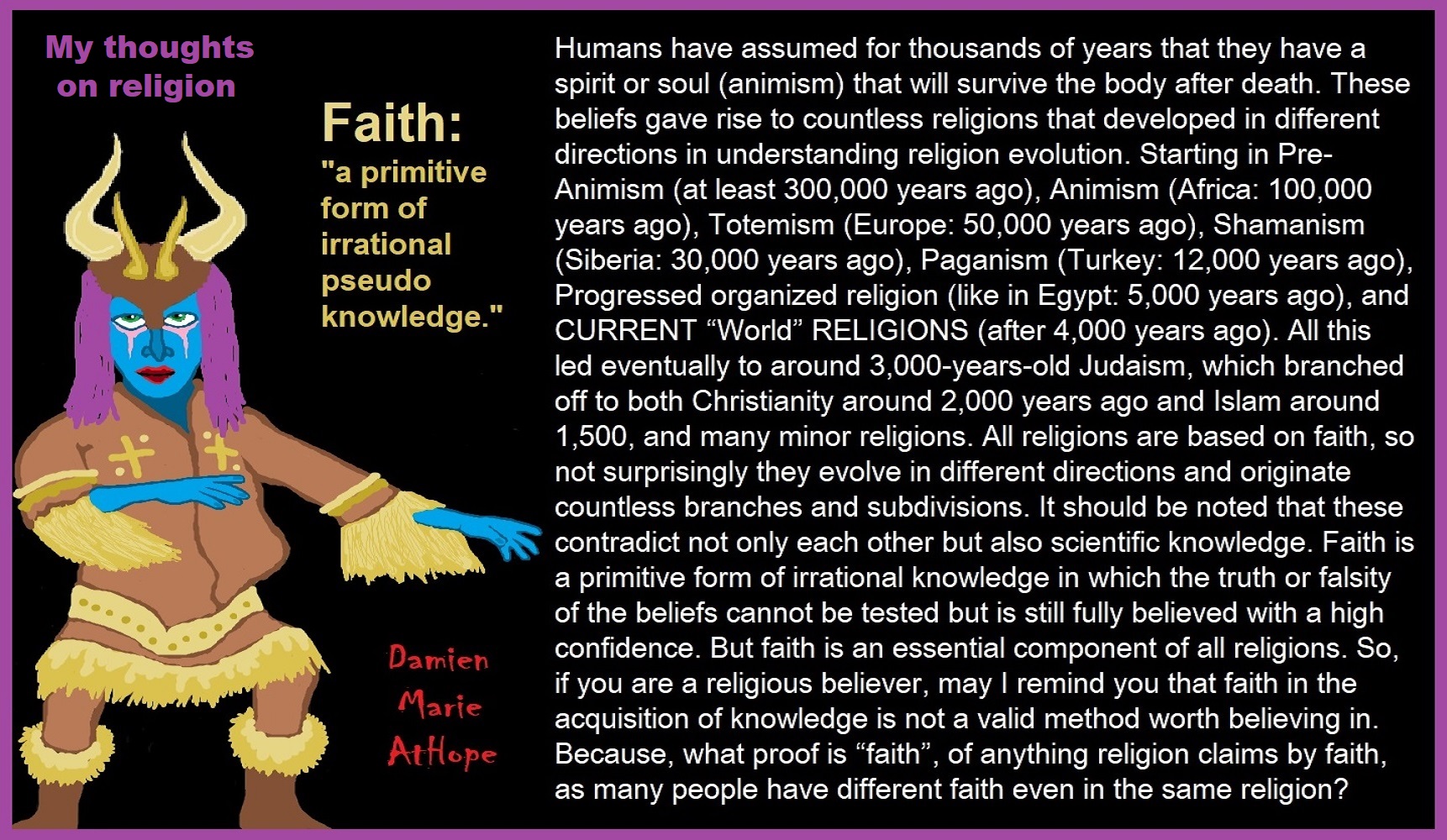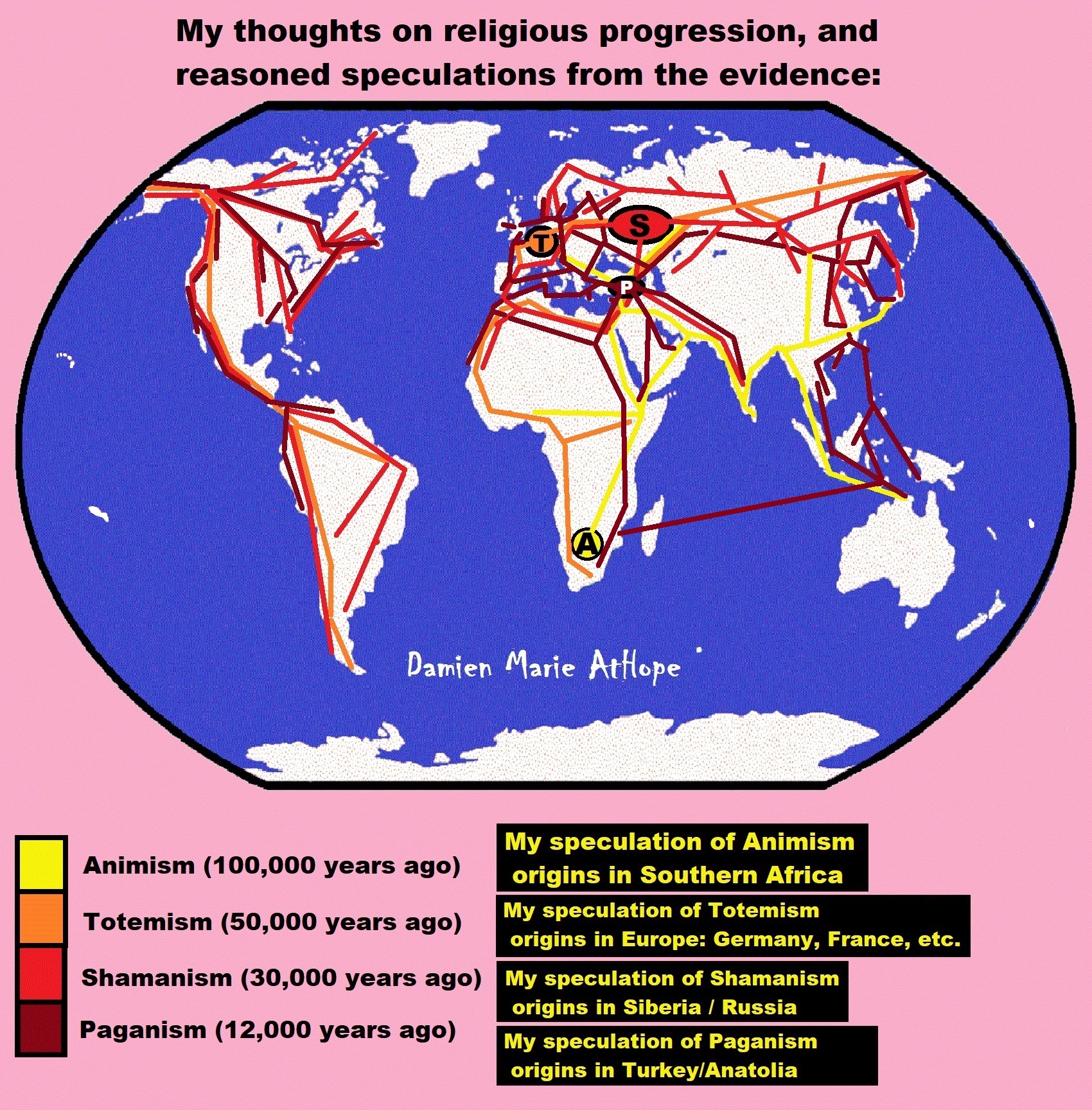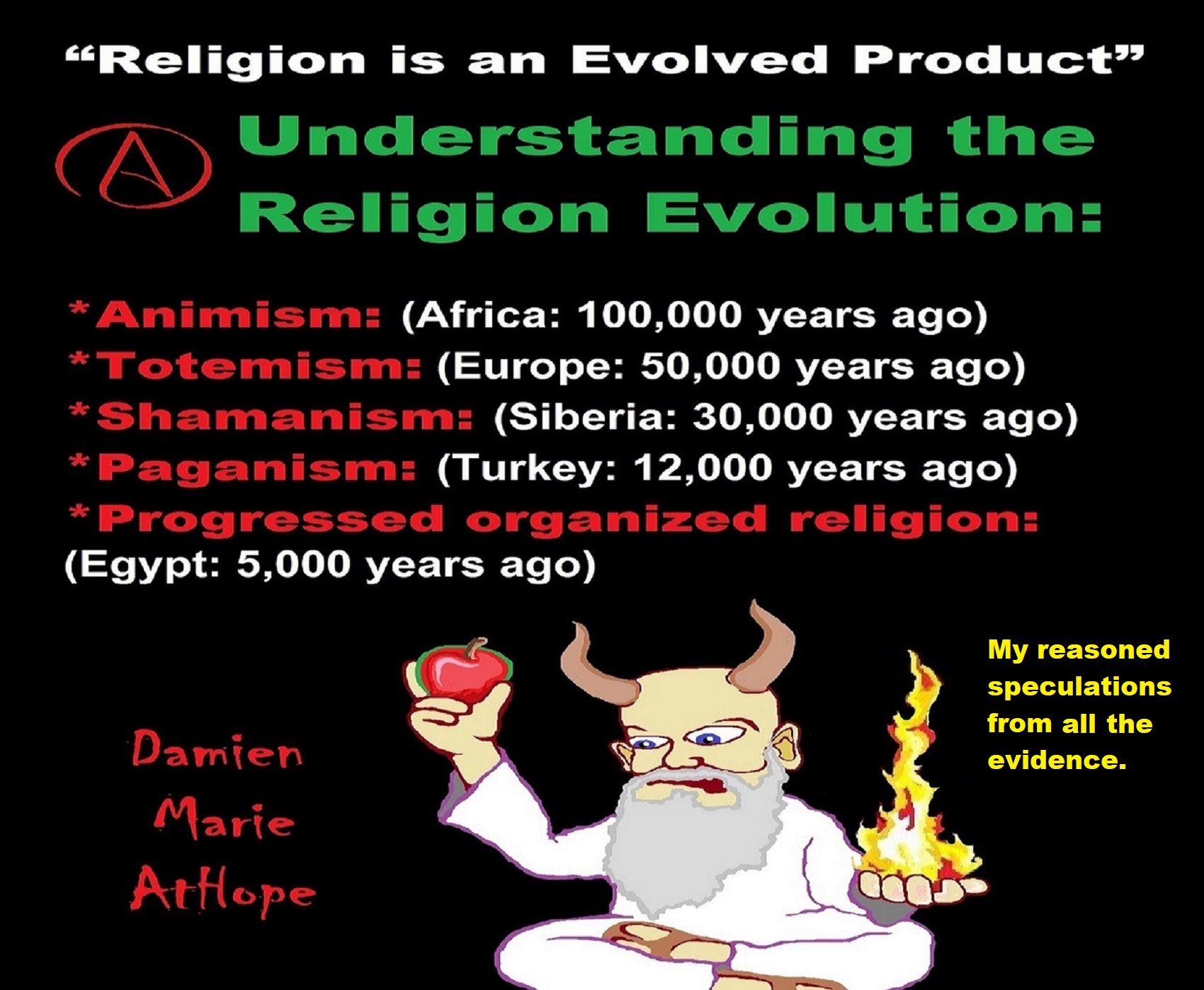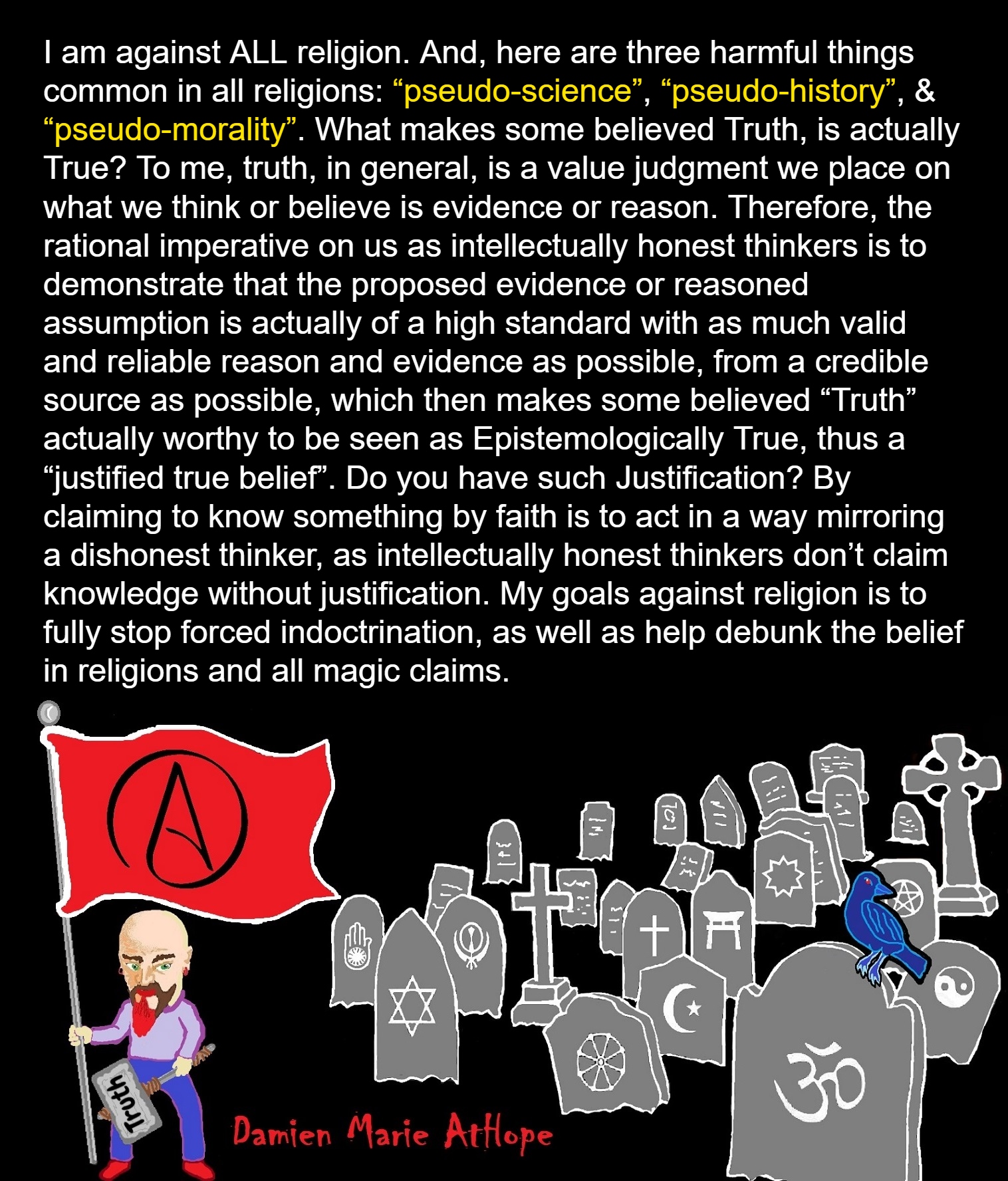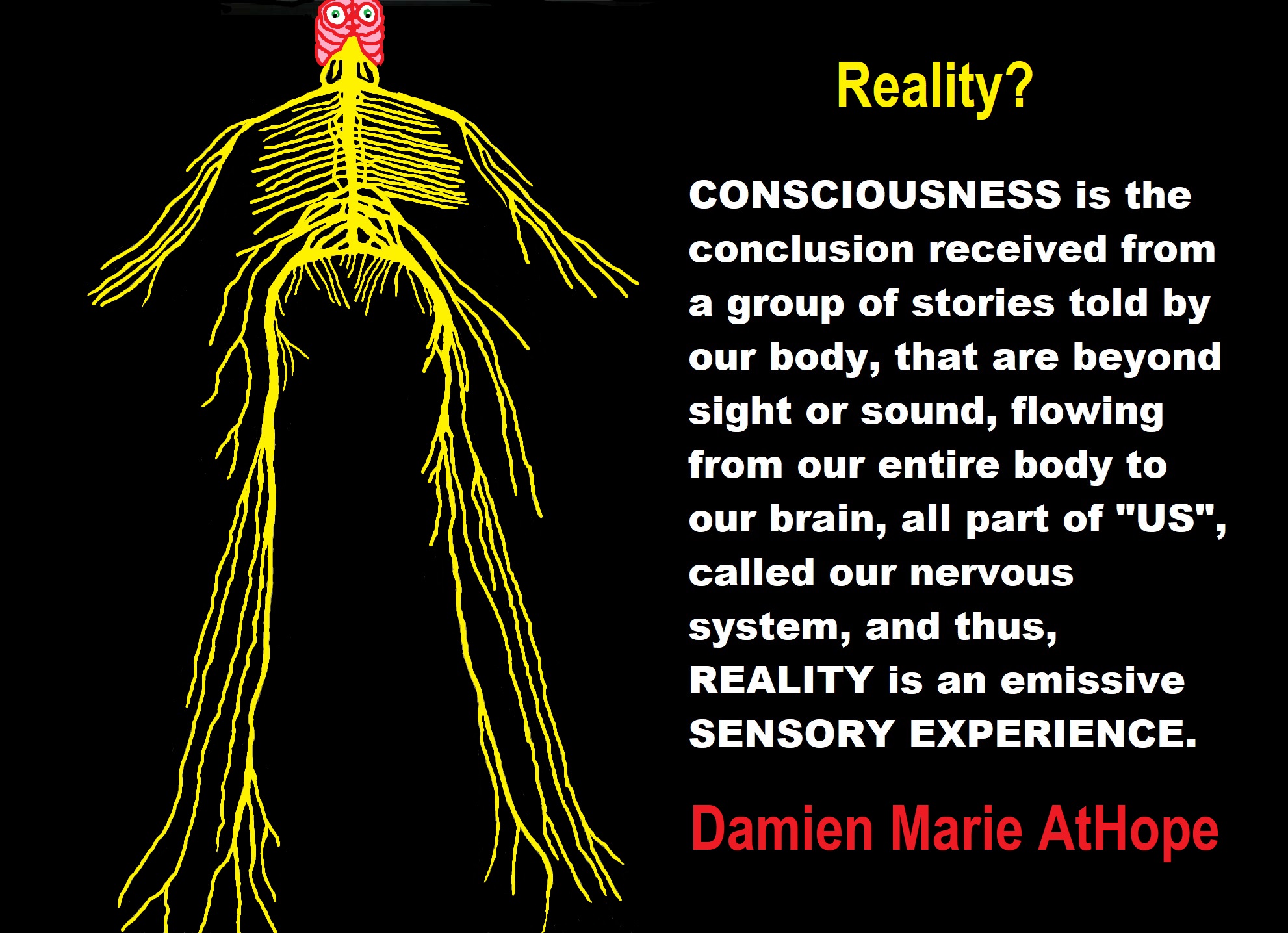
My atheism is a fell defended and philosophically rich nonbelief/disbelief position or style and its well supported thinking of axiological atheism. Axiological (value theory or value science; a social science) atheist. Or put it in an easier way think of it kind of like moral argument reasoned and ethical driven strong atheism (disbelief in god’s). Axiological atheism: (Ethical/Value theory Reasoned and Moral Argument driven) Atheism, Anti-theism, Anti-religionism, and Secular Humanism. Axiological atheism = Strong Disbelief as well as Strong Secularism and Humanism. To learn more check out: “Axiological Atheism Explained” https://damienmarieathope.com/2015/10/30/axiological-atheism-explained/
The Three Dimensions of Realist Commitment?
According to Anjan Chakravartty with The Stanford Encyclopedia of Philosophy, “The description of scientific realism as a positive epistemic attitude towards theories, including parts putatively concerning the unobservable, is a kind of shorthand for more precise commitments (Kukla 1998, ch. 1, Niiniluoto 1999, ch. 1, Psillos 1999, Introduction, Chakravartty 2007a, ch. 1). Traditionally, realism more generally is associated with any position that endorses belief in the reality of something. Thus, one might be a realist about one’s perceptions of tables and chairs (sense datum realism), or about tables and chairs themselves (external world realism), or about mathematical entities such as numbers and sets (mathematical realism), and so on. Scientific realism is a realism about whatever is described by our best scientific theories—from this point on, ‘realism’ here denotes scientific realism. But what, more precisely, is that? In order to be clear about what realism in the context of the sciences amounts to, and to differentiate it from some important antirealist alternatives, it is useful to understand it in terms of three dimensions: a metaphysical (or ontological) dimension; a semantic dimension; and an epistemological dimension. Metaphysically, realism is committed to the mind-independent existence of the world investigated by the sciences. This idea is best clarified in contrast with positions that deny it. For instance, it is denied by any position that falls under the traditional heading of ‘idealism’, including some forms of phenomenology, according to which there is no world external to and thus independent of the mind. This sort of idealism, though historically important, is rarely encountered in contemporary philosophy of science, however. More common rejections of mind-independence stem from neo-Kantian views of the nature of scientific knowledge, which deny that the world of our experience is mind-independent, even if (in some cases) these positions accept that the world in itself does not depend on the existence of minds. The contention here is that the world investigated by the sciences—as distinct from “the world in itself” (assuming this to be a coherent distinction)—is in some sense dependent on the ideas one brings to scientific investigation, which may include, for example, theoretical assumptions and perceptual training; this proposal is detailed further in section 4. It is important to note in this connection that human convention in scientific taxonomy is compatible with mind-independence. For example, though Psillos (1999, p. xix) ties realism to a ‘mind-independent natural-kind structure’ of the world, Chakravartty (2007a, ch. 6) argues that mind-independent properties are often conventionally grouped into kinds (see also Boyd 1991 and Humphreys 2004, pp. 22–25, 35–36). Semantically, realism is committed to a literal interpretation of scientific claims about the world. In common parlance, realists take theoretical statements at “face value”. According to realism, claims about scientific entities, processes, properties, and relations, whether they be observable or unobservable, should be construed literally as having truth values, whether true or false. This semantic commitment contrasts primarily with those of so-called instrumentalist epistemologies of science, which interpret descriptions of unobservables simply as instruments for the prediction of observable phenomena, or for systematizing observation reports. Traditionally, instrumentalism holds that claims about unobservable things have no literal meaning at all (though the term is often used more liberally in connection with some antirealist positions today). Some antirealists contend that claims involving unobservables should not be interpreted literally, but as elliptical for corresponding claims about observables. Epistemologically, realism is committed to the idea that theoretical claims (interpreted literally as describing a mind-independent reality) constitute knowledge of the world. This contrasts with sceptical positions which, even if they grant the metaphysical and semantic dimensions of realism, doubt that scientific investigation is epistemologically powerful enough to yield such knowledge, or, as in the case of some antirealist positions, insist that it is only powerful enough to yield knowledge regarding observables. The epistemological dimension of realism, though shared by realists generally, is sometimes described more specifically in contrary ways. For example, while many realists subscribe to the truth (or approximate truth) of theories understood in terms of some version of the correspondence theory of truth (as suggested by Fine 1986 and contested by Ellis 1988), some prefer deflationary accounts of truth (including Giere 1988, p. 82, Devitt 2005, and Leeds 2007). Though most realists marry their position to the successful reference of theoretical terms, including those for unobservable entities, processes, properties, and relations (Boyd 1983, and as described by Laudan 1981), some deny that this is a requirement (Cruse & Papineau 2002, Papineau 2010). Amidst these differences, however, a general recipe for realism is widely shared: our best scientific theories give true or approximately true descriptions of observable and unobservable aspects of a mind-independent world.”
Science is quite the opposite of just common sense.
As a rationalist, I want you to deeply think and not just simply doubt.
“Scientific realism is a positive epistemic attitude towards the content of our best theories and models, recommending belief in both observable and unobservable aspects of the world described by the sciences.” Ref
“Scientific realism is, at the most general level, the view that the world described by science is the real world as it is, independent of what it might be taken to be. Within philosophy of science, it is often framed as an answer to the question “how is the success of science to be explained?” The debate over the success of science in this context centers primarily on the status of unobservable entities apparently talked about by scientific theories. Generally, those who are scientific realists assert that one can make valid claims about unobservables (viz., that they have the same ontological status) as observables, as opposed to instrumentalism. Scientific realism involves the two basic positions. First, it is a set of claims about the features of an ideal scientific theory; an ideal theory is the sort of theory science aims to produce. Second, it is the commitment that science will eventually produce theories very much like an ideal theory and that science has done pretty well thus far in some domains. It is important to note that one might be a scientific realist regarding some sciences while not being a realist regarding others. For example, one might hold realist attitudes toward physics, chemistry and biology, and not toward economics, psychology and sociology.” Ref
What is Scientific Realism?
Epistemic Achievements versus Epistemic Aims
According to Anjan Chakravartty with The Stanford Encyclopedia of Philosophy, “It is perhaps only a slight exaggeration to say that scientific realism is characterized differently by every author who discusses it, and this presents a challenge to anyone hoping to learn what it is. Fortunately, underlying the many idiosyncratic qualifications and variants of the position, there exists a common core of ideas, typified by an epistemically positive attitude towards the outputs of scientific investigation, regarding both observable and unobservable aspects of the world. The distinction here between the observable and the unobservable reflects human sensory capabilities: the observable is that which can, under favourable conditions, be perceived using the unaided senses (for example, planets and platypuses); the unobservable is that which cannot be detected this way (for example, proteins and protons). This is to privilege vision merely for terminological convenience, and differs from scientific conceptions of observability, which generally extend to things that are detectable using instruments (Shapere 1982). The distinction itself has been problematized (Maxwell 1962, Churchland 1985, Musgrave 1985, Dicken & Lipton 2006), but if it is problematic, this is arguably a concern primarily for certain forms of antirealism, which adopt an epistemically positive attitude only with respect to the observable. It is not ultimately a concern for scientific realism, which does not discriminate epistemically between observables and unobservables per se. Before considering the nuances of what scientific realism entails, it is useful to distinguish between two different kinds of definition in this context. Most commonly, the position is described in terms of the epistemic achievements constituted by scientific theories (and models—this qualification will be taken as given henceforth). On this approach, scientific realism is a position concerning the actual epistemic status of theories (or some components thereof), and this is described in a number of ways. For example, most define scientific realism in terms of the truth or approximate truth of scientific theories or certain aspects of theories. Some define it in terms of the successful reference of theoretical terms to things in the world, both observable and unobservable. (A note about the literature: ‘theoretical term’, prior to the 1980s, was standardly used to denote terms for unobservables, but will be used here to refer to any scientific term, which is now the more common usage.) Others define scientific realism not in terms of truth or reference, but in terms of belief in the ontology of scientific theories. What all of these approaches have in common is a commitment to the idea that our best theories have a certain epistemic status: they yield knowledge of aspects of the world, including unobservable aspects. (For definitions along these lines, see Smart 1963, Boyd 1983, Devitt 1991, Kukla 1998, Niiniluoto 1999, Psillos 1999, and Chakravartty 2007a.) Another way to think about scientific realism is in terms of the epistemic aims of scientific inquiry (van Fraassen 1980, p. 8, Lyons 2005). That is, some think of the position in terms of what science aims to do: the scientific realist holds that science aims to produce true descriptions of things in the world (or approximately true descriptions, or ones whose central terms successfully refer, and so on). There is a weak implication here to the effect that if science aims at truth and scientific practice is at all successful, the characterization of scientific realism in terms of aim may then entail some form of characterization in terms of achievement. But this is not a strict implication, since defining scientific realism in terms of aiming at truth does not, strictly speaking, suggest anything about the success of scientific practice in this regard. For this reason, some take the aspirational characterization of scientific realism to be too weak (Kitcher 1993, p. 150, Devitt 2005, n. 10, Chakravartty 2007b, p. 197)—it is compatible with the sciences never actually achieving, and even the impossibility of their achieving, their aim as conceived on this view of scientific realism. Most scientific realists commit to something more in terms of achievement, and this is assumed in what follows.” Ref
No, science CAN NOT be with religion.
Science is a method to understand the world as it is, which is naturalistic only, not one shred of magic. In fact, the scientific method assumes Methodological Naturalism, because that is all that has ever been found and is the most likely thing that ever will be found. As religion is not intended to represent the world as it is but instead what it is not the stupid supernatural, which is the thing of fantasy, wishful thinking and delusion.
The neuroscience of prejudice and stereotyping
Explaining science to remove MISCONCEPTION
Science Facts Should Make Religious Belief Impossible
Quit Trying to Invent Your God From the Scraps of Science.
Science and Justified True Beliefs
I Hate Religion Just as I Hate Pseudoscience
Creationism is a Debunked Religious Conspiracy Theory.
Rationalism, Freethinker, Humanism & Secular humanism?
I was asked what is a good book on how I use rationalism?
We must not confuse beliefs, religion is beliefs built from myths devoid of corroborating evidence. Science uses corroborating evidence to establish what is true and that offers something worthy to believe.
What is a god? Theological Noncognitivist & Ignosticism?
I Am a Rationalist and Support Reasonable Skepticism?
Agnosticism No Thanks, I am Ignostic
Is it correct to hold a belief that theists, such as Christians actually have a concept of something nonexistent labeled “GOD”, just like we all have a concept of something nonexistent labeled “unicorns”?
Do they really have any reality tangible concept to label “the god concept” because without it are not beliefs about “the god concept” reality intangible? A concept of something nonexistent labeled “GOD”, is not tangible and is incapable of being perceived as something in or of reality. It is an unknowable reality intangible unfounded speculation, not a known concept.
Such as, can we not form a somewhat reality tangible concept to label “the unicorn concept,” for we can conceive of a horse and a singular horn in order to intelligibly have a unicorn concept. Can we not generate a mental picture of a concept that fits the label unicorn, but one cannot really close their eyes and conjure up any concept of anything labeled “GOD” even though no one has any more reason to believe in unicorns then gods.
I do reject that the god label has any meaning in reality and that any effort given to a god concept is still nothing but lies made up claiming to know or give believed qualities and it is that which I am rejecting as an atheist. But when asked if I believe an offered dity such as Allah to me I am a ignostic atheist (I reject the god label as expressing anything real and also reject the belief of any god concept connecting to anything real).
I don’t believe that the label “God” refers to anything imaginable. That doesn’t mean I don’t also reject the claim offered thus am Atheist as well. You are saying I must choose and I am saying I don’t think I have to. If you ask is god a intelligible thing no. Do I believe the claims given to it no. Thus, to me I can be both hold in myself the stance it is meaningless therefore Ignostic and reject their claim of a god so am an atheist.
To me Christians, Jews, Muslims, etc., do not really believe in a god at all as no one can, as there is no way to actually believe in an undefinable in reality, unknown from reality, and nonpositional to reality as the opposite is required to know something, therefore this only believe that they believe that the label “God” refers to something imaginable but god is like a square circle statable in words even understandable as separate pieces but impossible by design when added together.
Theological noncognitivism atheism: theological noncognitivism atheists – holds that the statement “god exists” does not express a proposition, but is nonsensical or cognitively meaningless. A theological noncognitivist atheist claims “god” does not refer to anything that exists, “god” does not refer to anything that does not exist, “god” does not refer to something that may or may not exist, and “god” has no literal significance, just as “Fod” has no literal significance. The term God was chosen for this example, obviously any theological term [such as “Yahweh” and “Allah”] that is not falsifiable is subject to scrutiny. Many people who label themselves “theological noncognitivists” claim that all alleged definitions for the term “God” are circular, for instance, “God is that which caused everything but God”, defines “God” in terms of “God”. They also claim that in Anselm’s definition “God is that than which nothing greater can be conceived”, that the pronoun “which” refers back to “God” rendering it circular as well. Others who label themselves “theological noncognitivists” argue in different ways, depending on what one considers the “theory of meaning” to be. Michael Martin, writing from a verificationist perspective, concludes that religious language is meaningless because it is not verifiable. 1
Ignostic atheism: ignosticism is similar to agnosticism, but where agnosticism is the claim that you can’t know something (god), ignosticism is the claim that, if the definition of something (god) is incoherent, then it can’t be meaningfully discussed, and if the definition of something (god) is unfalsifiable, then it has no meaning. Ignosticism or igtheism is the idea that every theological position assumes too much about the concept of God and other theological concepts. Ignosticism could possibly be one of the best argument against god concepts ever as it sees all efforts surrounding existence of a God concept semantically twisting the definition of God to mean that which is incomprehensible. If God is incoherent then the experiences believers attribute to God are by extension unintelligible and therefore meaningless. In which case you void any and all purported experiences of God because you couldn’t comprehend them. Ignostic atheism holds two interrelated views about to reject all God concepts. They are as follows: 1) The view that a coherent definition of God must be presented before the question of the existence of god can be meaningfully discussed. 2) If the definition provided is unfalsifiable, the Ignostic atheist takes the theological noncognitivist position that the question of the existence of a God concept is rendered meaningless thus must stay refuted. As with any topic, and especially in the realm of the supernatural and woo, the subject of any debate should be coherently defined. If one offers a clear definition of an entity, then in order to take a position whether it exists or not the definition of the entity must be one in which its existence can be falsified (there is a rational and logical method by which we can test the existence of the subject as it has been defined). Few theists ever offer a clear definition of God. The few who do offer a definition almost never offer one in which the existence of that God could be tested. The rare falsifiable definition offered regarding God’s existence is easily falsified. And so as with any subject (such as the existence of almost all supernatural entities) debate about the existence of God is, for the far majority of such conversations, pointless. 123
Noncognitivism atheism: is the position that religious language — and specifically religious terms like “god” — are not (cognitively) meaningful. Noncognitivism atheism argues that religious language is not meaningful because its empirical claims cannot be verified, even in theory. Likewise they further think there are no positive attributes that can be ascribed to entities like “god,” and entities without attributes are meaningless.This means that noncognitivism denies the essential meaningfulness of religious language, religious arguments, and religious apologetics. If they aren’t meaningful, then they can’t be either true or false and believing them to be true is pointless. 1
Evidential atheism: thinks that whether or not belief in a divine being is epistemically acceptable will be determined by the evidence. I intend to treat “evidence” in a broad sense including a priori arguments, arguments to the best explanation, inductive and empirical reasons, as well as deductive and conceptual premises. (Also note that one could be an evidentialist theist.) The evidentialist theist and the evidentialist atheist may have a number of general epistemological principles concerning evidence, arguments, implication in common, but then disagree about what the evidence is, how it should be understood, and what it implies. They may disagree, for instance, about whether the values of the physical constants and laws in nature constitute evidence for intentional fine tuning, but agree that whether God exists is a matter that can be explored empirically. 1
Non-evidential atheism: goes beyond a limitation in common atheism which likely is using evidentialist theory of knowledge which is any theory of knowledge that says that having evidence for a thing is necessary for knowing that thing. A non-evidentialist theory of knowledge denies this most commonly offering instead two additional non-evidentialist theories of knowledge: the causal theory, and reliabilism. Even if a belief lacks a credible rational it is not automatically irrational it may simply be utilizing a less supported or even wishful idealism stance that may even be somewhat flawed and yet still not irrational which is to be without the faculty of reason or deprived of reason. According to the Causal Theory of Knowledge, the difference between a true belief that isn’t knowledge and a true belief that is amounts to the following: if a true belief that P is knowledge, then it is causally connected to the fact that P. The simplest sort of causal connection would be direct: one where the fact that P is the cause of a subject’s belief that P. Causal connections can also be indirect: perhaps the fact that P causes the fact that Q which causes the subject to believe that P. It allow that you can know P if P is “logically related” to a fact that is causally connected to your believing P. According to the Reliabilism theory of Knowledge, which holds that the difference between mere true belief on the one hand and knowledge on the other is that the latter is formed via a reliable process: Reliabilism S knows that P if and only if S’s true belief that P was caused by a reliable process. What is a “reliable process”? Well, think of an analogy. A reliable car is one that generally works when you want it to. What “work” do we want our belief-forming processes to do? We want them to form true beliefs. So a reliable belief-forming process is one that generally leads to true beliefs. Reliabilism says that knowledge is true belief that was formed by a process that can generally be relied on to form true beliefs. As long as perception, memory, testimony, and reasoning are reliable in this sense, they can give us knowledge. If the processes of reasoning that lead us to form inductive generalizations (like “All men are mortal”) are reliable, then according to RT, they can lead us to knowledge. 1
Experiential atheism: The second type of argument commonly advanced against the doctrine of divine omniscience attributed to a god something, which is the problem of experiential knowledge. This is that there appear to be certain kinds of knowledge that can only be acquired by having certain kinds of experiences. The Problem of Experiential Knowledge: (1) There are some items of knowledge that can only be acquired through experience. (2) Some of the experiences through which items of knowledge that can only be acquired through experience are acquired are such that they cannot be had by a god something. (3) If some of the experiences through which items of knowledge that can only be acquired through experience are acquired are such that they cannot be had by a god something, then there are some items of knowledge that cannot be acquired by a god. Therefore: (4) There are some items of knowledge that cannot be acquired by a god something. (5) If there are some items of knowledge that cannot be acquired by a god something then it is not the case that a god something is omniscient. Therefore: (6) It is not the case that a god something is omniscient. 1
Humanist atheism: humanist atheism is most likely secular humanism with atheism added. Secular humanism is alternatively known by some adherents as Humanism, specifically with a capital H to distinguish it from other forms of lowercase humanism. Humanist atheism embraces human reason, ethics, social justice and philosophical naturalism, while specifically rejecting religious dogma, supernaturalism, pseudoscience or superstition as the basis of morality and decision making. Humanism is a philosophical and ethical stance that emphasizes the value and agency of human beings, individually and collectively, and generally prefers critical thinking and evidence (rationalism, empiricism) over established doctrine or faith (fideism). Generally, humanism refers to a perspective that affirms some notion of human freedom and progress. In modern times, humanist movements are typically aligned with secularism, and today “Humanism” typically refers to a non-theistic life stance centered on human agency, and looking to science instead of religious dogma in order to understand the world. Humanist atheism believes there is a need to hold disbelief on the god question because most concepts god holds that god is the only giver or definer of rights, ethical, justice or truth. Thus Humanist atheism assorts only disbelief and god removal in relevance can then embrace human reason, ethics, and social justice. Humanistic atheism values human reality in naturalism, rejecting religious dogma, supernaturalism, pseudoscience or superstition as the basis of social morality and human decision making. It posits that human beings are capable of being ethical and moral without religion or a god. It does not, however, assume that humans are either inherently evil or innately good, nor does it present humans as being superior to nature. 1 2
Ontological atheism: ontological atheism asserts Ontological theism arguments aim too high. Just like logical calculus cannot ascertain a specific basic proposition is correct, existential calculus should not be able to conclude that some specific being exists. Logical calculus can show that if a bachelor exists then a man exists (since a bachelor is, specifically, a man), and existential calculus might be able to show that if certain things exist then a god something exists. But ontological arguments try to prove that something (god) exists without committing to the existence of any specific thing. They can therefore be roughly divided into several types:- (a) ones that assume that a god something exists from the get-go, but disguise it in some way; (b) ones that make an error in existential calculus, so are not sound; (c) ones that are correct but trivial, e.g. showing that the sum of all things exists in some sense. rethinks if one agrees that the existence of a god something has indeed been proven, you still really don’t know much about that god other than that it is infinite and perfect. These characteristics seem to be quite dangerous in light of the characteristics of a god something that have been posited by many organized religions. They posit someone who cares for us and who would simultaneously damn us to eternity in hell for our failure to believe in him thus we cannot and should not believe in a god something. Using rationality, one cannot conceive of a god something with infinite perfection, with anthropomorphic qualities (i.e. human motivation, characteristics, or behavior) or an infinite god holding judgments or care about what humans do. Ontological atheism reveals that the Ontological theism argument is problematic on four grounds: A) It defines a god something as a Necessary being which is necessarily O, and then “derives” that god is a necessary being. This isn’t so much a flaw as it is misleading. B) It assumes that which it seeks to prove, namely it assumes that the Necessary-god-Something is logically possible, which denies the very possibility that god doesn’t exist. Instead of wrestling with the claim that god doesn’t exist and showing it is false, the argument a-priori assumes that it is false. C) It relies on a confusion between epistemic and logical possibility. As a broad proposition the Necessary-god-Something needs to be treated as an epistemic possibility, leading to a weakened 1B which cannot support the rest of the argument. D) Even the weakened 1B should not be accepted. Like all Necessary postulates, that a Necessary-god-Something exists is either true in all possible worlds or not true in all possible worlds. The argument doesn’t advance the position that it is true in all possible worlds. Ontology (Greek meaning ontos, “being; that which is”; and logos meaning “discourse, study, ratio, calculation, reason”). Ontology is the philosophical study of the nature of being, becoming, existence, or reality, as well as the basic categories of being and their relations. *Ontology (thingness of things) questions to define or compare and contrast thingness.* Ontology “Reality” questions/assertion: Witness gives evidence about the claim. Ontology, (understanding the thingness of things; like what is or can be real, like not god). -What is your claim? -What aspects must be there for your claim? -What makes your claim different than other similar claims? Take for instance how Religion supporters try the evaluation tactic of saying “there are peaceful Religions.” I may respond, what do you mean by Religion and what do you mean by painful or good” (asking to find the truth or as usual expose the lack of a good Ontology). To me belief ontologies address the conceptual schemas involved, at the intersection of three elements: A belief is a placeholder for a mental agreement to a offered idea, behavior or thing. We dont know what us being accurately believed and this mans all beliefs are open to challenge or they should be. Many people either have no standard to how they test or process their thinking and thus have untrustworthy and such a lack of a developed thought structure employ thinking systems with a high susceptibility to flaws, And this is where we use ontological challenging or ontological disproofs which are logical arguments posed against arguments made by an attacker/challenger to hone in and access the thinking of believing flaws, and the attacker capability to exploit a flaw. Ontological disproofs, are sophisticated ontological arguments, ontological challenges or ontological disproofs accusations that demand equally sophisticated responses, to which, many people are unprepared. Belief or argument forms should be valid, to prove them sound or unsound, strong/weak, or well defined/undefined, as weak premises must be shown to be false. By use ontological challenging, you are shining a light on its ways claimed or points proposed, outlined or arranged which equals a thing or its qualities to define it that makes the depth and fullness to a being or thing, like just what is provisional about the thing in question or offer, are the characteristics of adequate development structure and infrastructure of the ontology involved in claims or propositions as truth, fact, or knowledge? One ontological criticism focuses on the semantics that are given for quantifiers qualities used or involved as the notation of the language representations of the contents of belief talk, proposing that the qualities offered are fully alike (unequivocal) when the items or properties identified to you are likely one of the three partly unlike (equivocal). To me, ontologies are like an adequate way or web of elements involved in the thingness of things or ideas. Point by slow methodological point, is the most effective way to use ontological challenging. Ontologically challenge needs to be done, in order to develop in the other person, an ontological insecurity about what the person, place, thing, or idea are construction of and just what is being claimed, portrayed or proposed as truth, fact, or knowledge? A belief or set of beliefs, likely have a relationship between ideas of the thing expose the cracks and fissure in the conceptualizations divided up or overlap but often while a belief or set of beliefs are offered with assurance, they instead ontologically inadequate or almost completely ontologically empty. By exposing ontological vulnerabilities or weakness in a belief or set of beliefs can rise person’s sense of ontological Insecurity as the thinker realized they may not know that that know. In my way of thinking as ontological insecurity refers or relates to in an existential sense a person’s sense of “belief” deflation, discrediting, or disproving. Such an ontologically insecure thinker, may be so ontologically desperate, to stop/lower believing/accepting the level of “reality or existence” of the things or ideas they were just referring to. In contrast, the ontologically secure thinker, may be so ontologically stable in relation to ontological commitment of their fragments involved to feel a high level. Ontological arguments or Ontological commitment need to demonstrate or require demonstration of the disciplined or disordered structures but, a priori and necessary premises to the conclusion. 1, 2
Philosophical atheism: uses philosophy to justify non-belief. Philosophical atheists have not shared a common set of atheism no god or gods exist views, philosophical convictions can often set them off from other groups of atheism thinkers. There are different kinds of philosophical atheists as well as many philosophical justifications for atheism. Many rationalist atheists feel that the idea of a god something as presented by the major religions is essentially self-contradictory, and that it is logically impossible that such a god something could exist. Others are atheists through skepticism, because they see no evidence that a god something exists. Of course, some people are atheists without having any particular logical argument to back up their atheism. For some, it is simply the most comfortable, common sense position to take. Philosophical atheism is different addressing one of agnosticism’s biggest objections the limit to knowledge a god something exists or agnosticism’s believed impossibility to prove the nonexistence of something. There are many counterexamples to prove the nonexistence of something. For example, it is quite simple to prove that there does not exist a prime number larger than all other prime numbers. Of course, this deals with well-defined objects obeying well-defined rules. Whether a god somethings or universes are similarly well-defined is a matter for debate. However, assuming for the moment that the existence of a god something is not provably impossible, there are still subtle reasons for assuming the nonexistence of a god something. If we assume that something does not exist, it is always possible to show that this assumption is invalid by finding a single counterexample. If on the other hand we assume that something does exist, and if the thing in question is not provably impossible, showing that the assumption is invalid may require an exhaustive search of all possible places where such a thing might be found, to show that it isn’t there. Such an exhaustive search is often impractical or impossible. There is no such problem with largest primes, because we can prove that they don’t exist. Therefore it is generally accepted that we must assume things do not exist unless we have evidence that they do. To assume that a god something exists is to make an assumption which probably cannot be tested. We cannot make an exhaustive search of everywhere a god something might be to prove that he doesn’t exist anywhere. If a god something interacts with our universe in any way, the effects of his interaction must have some physical manifestation. Hence his interaction with our universe must be in principle detectable. If a god something is essentially undetectable, it must therefore be the case that he does not interact with our universe in any way. Many atheists would argue that if a god something does not interact with our universe at all, it is of no importance whether he exists or not. A thing which cannot even be detected in principle does not logically exist. Things do not exist merely because they have been defined to do so. We know a lot about the definition of Santa Claus–what he looks like, what he does, where he lives, what his reindeer are called, and so on. But that still doesn’t mean that Santa exists. 1
I reject that even the term god has any valid coherent meaning outside myths.
Agnostic vs Ignostic?
Epistemological atheism: highlights a branch of philosophy that deals with determining what is and what is not true, and why we believe or disbelieve what we or others do. On one hand, this is begging the question of having the ability to measure “truth” – as though there is an “external” something that one measures against. Epistemology is the analysis of the nature of knowledge, how we know, what we can and cannot know, and how we can know that there are things we know we cannot know. In Greek episteme, meaning “knowledge, understanding”, and logos, meaning “discourse, study, ratio, calculation, reason. Epistemology is the investigation of what distinguishes justified belief from opinion. In other words, it is the academic term associated with study of how we conclude that certain things are true. Epistemology: the theory of knowledge, especially with regard to its methods, validity, and scope. From this atheist orientation, there is no, nor has there ever been, nor will there ever be, any “external” something so there can be no god-concept. Many debates between atheist and theists revolve around fundamental issues which people don’t recognize or never get around to discussing. Many of these are epistemological in nature: in disagreeing about whether it’s reasonable to believe in the existence of a god something, to believe in miracles, to accept revelation and scriptures as authoritative, and so forth, atheists and theists are ultimately disagreeing about basic epistemological principles. Without understanding this and understanding the various epistemological positions, people will just end up talking past each other. it’s common for Epistemological atheism to differ in what they consider to be appropriate criteria for truth and, therefore, the proper criteria for a reasonable disbelief. Atheists demand proof and evidence for other worldviews, yet there is no proof and evidence that atheism is true. Also, despite the abundant evidence for Christianity and the lack of proof and evidence for atheism, atheist reject the truth of Christianity. *Epistemology (knowledge of things) questions to explode or establish and confirm knowledge. Epistemology “Truth” questions/assertion: Lawyer searches for warrant or justification for the claim. Epistemology, (understanding what you know or can know; as in you do have and thing in this reality to know anything about this term you call god, and no way of knowing if there is anything non-naturalism beyond this universe and no way to state any about it if there where). -How do know your claim? -How reliable or valid must aspects be for your claim? -How does the source of your claim make it different than other similar claims? I may respond, “how do you know that, what is your sources and how reliable they are” (asking to find the truth or as usual expose the lack of a good Epistemology) Atheists refuse to go where the evidence clearly leads. In addition, when atheist make claims related to naturalism, make personal claims or make accusations against theists, they often employ lax evidential standards instead of employing rigorous evidential standards. For the most part, atheists have presumed that the most reasonable conclusions are the ones that have the best evidential support. And they have argued that the evidence in favor of a god something’s existence is too weak, or the arguments in favor of concluding there is no a god something are more compelling. Traditionally the arguments for a god something’s existence have fallen into several families: ontological, teleological, and cosmological arguments, miracles, and prudential justifications. For detailed discussion of those arguments and the major challenges to them that have motivated the atheist conclusion, the reader is encouraged to consult the other relevant sections of the encyclopedia. Arguments for the non-existence of a god something are deductive or inductive. Deductive arguments for the non-existence of a god something are either single or multiple property disproofs that allege that there are logical or conceptual problems with one or several properties that are essential to any being worthy of the title “GOD.” Inductive arguments typically present empirical evidence that is employed to argue that a god something’s existence is improbable or unreasonable. Briefly stated, the main arguments are: a god something’s non-existence is analogous to the non-existence of Santa Claus. The existence of widespread human and non-human suffering is incompatible with an all powerful, all knowing, all good being. Discoveries about the origins and nature of the universe, and about the evolution of life on Earth make the a god something hypothesis an unlikely explanation. Widespread non-belief and the lack of compelling evidence show that a god something who seeks belief in humans does not exist. Broad considerations from science that support naturalism, or the view that all and only physical entities and causes exist, have also led many to the atheism conclusion. 1 2 3 4
Ethical atheism: heavily involved and utilizes ethical thought and standards to navigate atheism or the humanism that is likely to follow such an ethical awareness. Ethical atheism strives to utilize the strong force of ethics and ethical challenge to address the many issues that not only arise in combating the fanatical promotion of harmful myths but ethical ways to positively navigate all of life’s real struggles or options to behave in interactions with others. God claims all totally lack a standard of meeting any warrant or justification in their burden of proof, thus the claim as offered debunks itself as any kind of viable claim. Would you be intellectually honest enough to want to know if your belief was completely false, and once knowing it was an unjustified belief, realize it lacks warrant and the qualities needed for belief-retention, as well as grasp the rationality that certain beliefs are epistemically unfounded which compels belief-relinquishment due to the beliefs insufficient supporting reason and evidence, realizing that belief. To me, belief in gods is intellectually flawed and dishonest compared to the evidence of the natural world being not only explainable on every level as only natural, but also there is not a shred of anything supernatural and every claim tested ever has time and again debunked such nonsense. If anything supernatural or paranormal was provable, the believers would have taken James Randi’s famous million-dollar challenge, or they would have gone and got their Nobel Prize in proving the supernatural or open up a 100% faith-based prayer and miracles hospital. Where the cure for anything and everything is guaranteed because “prayer and miracles works” and the only education was being a religious or spiritual leader. Prove it or it is not really worthy for true belief and if there was actual scientific proof it would silence us rationalists, atheists, and skeptics forever. However, nothing of the sort has ever happened. List of prizes for evidence of the paranormal or supernatural woo-woo go back to at least 1922 with Scientific American. But it did not stop there instead there has been many individuals and groups have offered similar monetary awards for proof of the paranormal or supernatural with some reaching over a million dollars yet as of February 2016, not one prizes have been claimed. Therefore, belief in supernatural or paranormal are not realistic nor are they reasonable. And what’s even crazier is it’s nonsense and they act like it is us rationalists, atheists, and skeptics that have to disprove something they have never proved. I do think critical thinkers and thinkers who are intellectually honest should follow something close to “The Ethics of Belief” or they are likely not honest thinkers. “The Ethics of Belief” was published in 1877 by philosopher William Kingdon Clifford outlined the famous principle “It is wrong always, everywhere, and for anyone to believe anything on insufficient evidence.” Arguing that it was immoral to believe things for which one lacks evidence, in direct opposition to religious thinkers for whom “blind faith” (i.e. belief in things in spite of the lack of evidence for them) was seen as a virtue. To me, it comes down to the question, would you be intellectually honest enough to want to know if your belief was completely false? And once knowing it was an unjustified belief, realize it lacks warrant and the qualities needed for belief-retention, as well as grasp the rationality that compels belief-relinquishment due to the beliefs insufficient supporting reason and evidence. The act of believing, just because one wants to believe, when everything contradicts the belief is intellectually unethical or deluded. Beliefs are directly connected to behavior, behavior is directly involved in ethics, and ethics requires involvement in social thinking which requires us to mature or discipline our beliefs. Ethics of Belief: sufficient evidence to support belief. An honest thinker would want to know what is sufficient evidence for the reliability and validity to support belief. According to the legal decision in 1950, evidence is sufficient when it satisfies an unprejudiced mind. Sufficient evidence can be said to reference the evidence of such value as to support the belief. The word sufficient does not mean conclusive. Conclusive evidence is evidence that serves to establish a fact or the proven truth of something. To me, the test for belief analysis in relation to the offered evidence attempting to affirm the belief, would be is it sufficient evidence such as, could any rational addresser of the belief in question to find the essential elements of the issue sufficiency evidence is beyond a reasonable doubt. it is reasonable to require a greater level of evidence proportional to the importance of the belief or the external effects of the belief. – IN THE MATTER OF THE ESTATE OF LUCILLE CRUSON STATE LAND BOARD V. LONG, ADM’R, ET AL. OREGON SUPREME COURT. ARGUED JUNE 13, 1950 REVERSED AUGUST 29, 1950 *538538 APPEAL FROM CIRCUIT COURT, LINN COUNTY, VICTOR OLLIVER, JUDGE. Someone asked why would a critical thinker follow another old book from 1877? Well the age of evidence or thinking is relevant if it is reasonable. Saying it’s age is old is not a refutation of its arguments. Moreover, it could be said that for ethical atheism applied logically “to me” in general ethics must be equally applied or the concept of ethics has no ethical meaning to begin with. Ethical atheism could be seen as thinking that if the idea of god implies the abdication of human reason and justice; it is the most decisive negation against of human rights, dignity, and liberty. Therefore ethical atheism holds a necessarily requirement to disbelief in order to end such unethical thinking and to end a god only morality enslavement of mankind. Ethical atheism holds all to ethical standards therefor if god did exist, it would be necessary to abolish him so we could be freely utilize human rights, dignity, reason and justice. Ethical atheism promotes atheism because it is both the logical and the ethical position to take in a world where religious people fly planes into skyscrapers, blow themselves up on crowded busses, and do all sorts of horrible things in the name of an imaginary sky monster. As an atheist ethicist, I am not just an Atheist (disbelieving claims of gods), an Antitheist (seeing theism as harmful) and an Antireligionist (seeing religion as untrue and/or harmful). Also as an atheist ethicist I value and require reason and evidence to support beliefs or propositions as well as am against all pseudohistory, pseudoscience, and pseudomorality. Why are gods even concerned with belief, as if they truly wanted it so bad they would be real and being more than just mental projections of which they are now they would show themselves and we all would believe. Therefore we can rightly conclude with no evidence of them at all, that belief in god(s) is the thing people do when playing at reality is valued more than understanding the actual natural only nature of reality. 1 2 3 4 5 6
Evidential atheism: thinks that whether or not belief in a divine being is epistemically acceptable will be determined by the evidence. I intend to treat “evidence” in a broad sense including a priori arguments, arguments to the best explanation, inductive and empirical reasons, as well as deductive and conceptual premises. (Also note that one could be an evidentialist theist.) The evidentialist theist and the evidentialist atheist may have a number of general epistemological principles concerning evidence, arguments, implication in common, but then disagree about what the evidence is, how it should be understood, and what it implies. They may disagree, for instance, about whether the values of the physical constants and laws in nature constitute evidence for intentional fine tuning, but agree that whether God exists is a matter that can be explored empirically. 1
Ignostic atheism: ignosticism is similar to agnosticism, but where agnosticism is the claim that you can’t know something (god), ignosticism is the claim that, if the definition of something (god) is incoherent, then it can’t be meaningfully discussed, and if the definition of something (god) is unfalsifiable, then it has no meaning. Ignosticism or igtheism is the idea that every theological position assumes too much about the concept of God and other theological concepts. Ignosticism could possibly be one of the best argument against god concepts ever as it sees all efforts surrounding existence of a God concept semantically twisting the definition of God to mean that which is incomprehensible. If God is incoherent then the experiences believers attribute to God are by extension unintelligible and therefore meaningless. In which case you void any and all purported experiences of God because you couldn’t comprehend them. Ignostic atheism holds two interrelated views about to reject all God concepts. They are as follows: 1) The view that a coherent definition of God must be presented before the question of the existence of god can be meaningfully discussed. 2) If the definition provided is unfalsifiable, the Ignostic atheist takes the theological noncognitivist position that the question of the existence of a God concept is rendered meaningless thus must stay refuted. As with any topic, and especially in the realm of the supernatural and woo, the subject of any debate should be coherently defined. If one offers a clear definition of an entity, then in order to take a position whether it exists or not the definition of the entity must be one in which its existence can be falsified (there is a rational and logical method by which we can test the existence of the subject as it has been defined). Few theists ever offer a clear definition of God. The few who do offer a definition almost never offer one in which the existence of that God could be tested. The rare falsifiable definition offered regarding God’s existence is easily falsified. And so as with any subject (such as the existence of almost all supernatural entities) debate about the existence of God is, for the far majority of such conversations, pointless. 1 2 3Investigative atheism: investigative atheism may take some interest in showing how the skeptical theistic way of reasoning, brought into the larger flow of total evidence skepticism, can be used to expose certain additional sources of doubt about theism sufficient to prevent overhasty migration to theism on the part of those left unconvinced by atheism. Moreover, and more positively, it can be used to inspire a greater openness to new religiously-relevant investigative results in the future. With these thoughts in mind, let’s add two more skeptical theses to our list: We have no good reason for thinking that the arguments from horrors or hiddenness against theism we know of are representative, relative to the property of (potentially) constituting a successful proof that theism is false, of the arguments from horrors or hiddenness against theism there are. And we have no good reason for thinking that the possible goods we know of are representative, relative to the property of consistency with a person being axiologically ultimate, of the possible goods there are but are always investigating and open. 1
Logical atheism: logical atheism holds that the various conceptions of gods, such as the personal god, are ascribed logically inconsistent qualities. Such atheists present deductive arguments against the existence of God, which assert the incompatibility between certain traits, such as perfection, creator-status, immutability, omniscience, omnipresence, omnipotence, omnibenevolence, transcendence, personhood (a personal being), nonphysicality, justice, and mercy. Logical arguments for atheism attempt to show that the concept of god is self-contradictory with some known fact. These incompatible-properties arguments attempt to demonstrate a contradiction in the concept of God. If an argument of this type were successful, it would mean that the existence of god is utterly impossible; there is a 0% probability that gods exists. 1 2
Materialistic atheism: materialists most likely value physicalism and may say that morality and concepts of god evolved thus extraordinary claims require extraordinary evidence so god is not reality nor is such myths authoritative. Atheists are usually materialists of some sort, rejecting the idea that there exists anything independent of the workings of matter and energy. Materialism often entails atheism unless a person believes in a purely physical god, but atheism does not entail materialism. It may be hard to believe in a god in a materialistic philosophy, but an atheistic philosophy need not be materialistic. Materialistic atheism could involve an individualistic thinking earthier consciously or subconsciously to fulfill a survival of the fittest “things” or “needs” (to consume or accumulate) in order to “survive” are a value physicalism requires since you are the only thing you can count on, knowing no god is waiting to help. 1
Metaphysical atheism: metaphysical atheism can include any doctrines that hold to a atheistic metaphysical monism (the homogeneity of reality). Only a metaphysical atheism is based on absolute metaphysical atheism thus subscribe to some degree of physicalism, and explicitly deny the existence of non-physical beings most notably gods. Metaphysical atheism may be either: a) absolute — an explicit denial of God’s existence associated with materialistic monism (all materialistic trends, both in ancient and modern times); b) relative — the implicit denial of God in all philosophies that, while they accept the existence of an absolute, conceive of the absolute as not possessing any of the attributes proper to God: transcendence, a personal character or unity. Relative atheism is associated with idealistic monism (apantheism, pantheism, panentheism, deism). Metaphysical atheism could be the view that a god exists but doesn’t have a mind, which is basically a special type of deism. One important distinction is precisely whether an atheist can be a deist or pantheist. One view of atheism is that no gods can exist. Another view is merely that personal gods don’t exist. 1
Naturalist atheism: naturalist atheism is the philosophical doctrine that the observable physical world is all there is thus there can be no god. Most philosophers of science adhere strictly to this view and positively deny that any supernatural or miraculous effects or forces are possible thus one is almost required to hold a view of atheism. Naturalist atheists are driven by the humility lacking desire to plumb the depths of reality, to know what objectively exists, to understand how things fundamentally work, and to have maximally transparent explanations of phenomena. Naturalist atheism thus is a philo-scientific way of knowing what can justifiably believe which gets us reliable beliefs about the world. Naturalist atheism can be called a philo-scientific epistemology because it combines openness to philosophical critique with a reliance on scientific criteria of explanatory adequacy as vetted by that critique and the actual practice of science. Naturalist atheism holds that science and philosophy are continuous, interpenetrating and collaborative in our investigation of reality; neither is foundational to the other. Naturalist atheism mainly wants not to be deceived by supernatural or divine being claims, or to make errors of logic or method or assumptions when understanding the world which leave open the possibility of a God’s existence. 1
Do you believe in god?
What is a god? Are you asking me if magic exists? Well my answer as an ignostic atheist is, first prove the actuality of simple magic before you try too ask anyone about the possibility of some supreme magic.
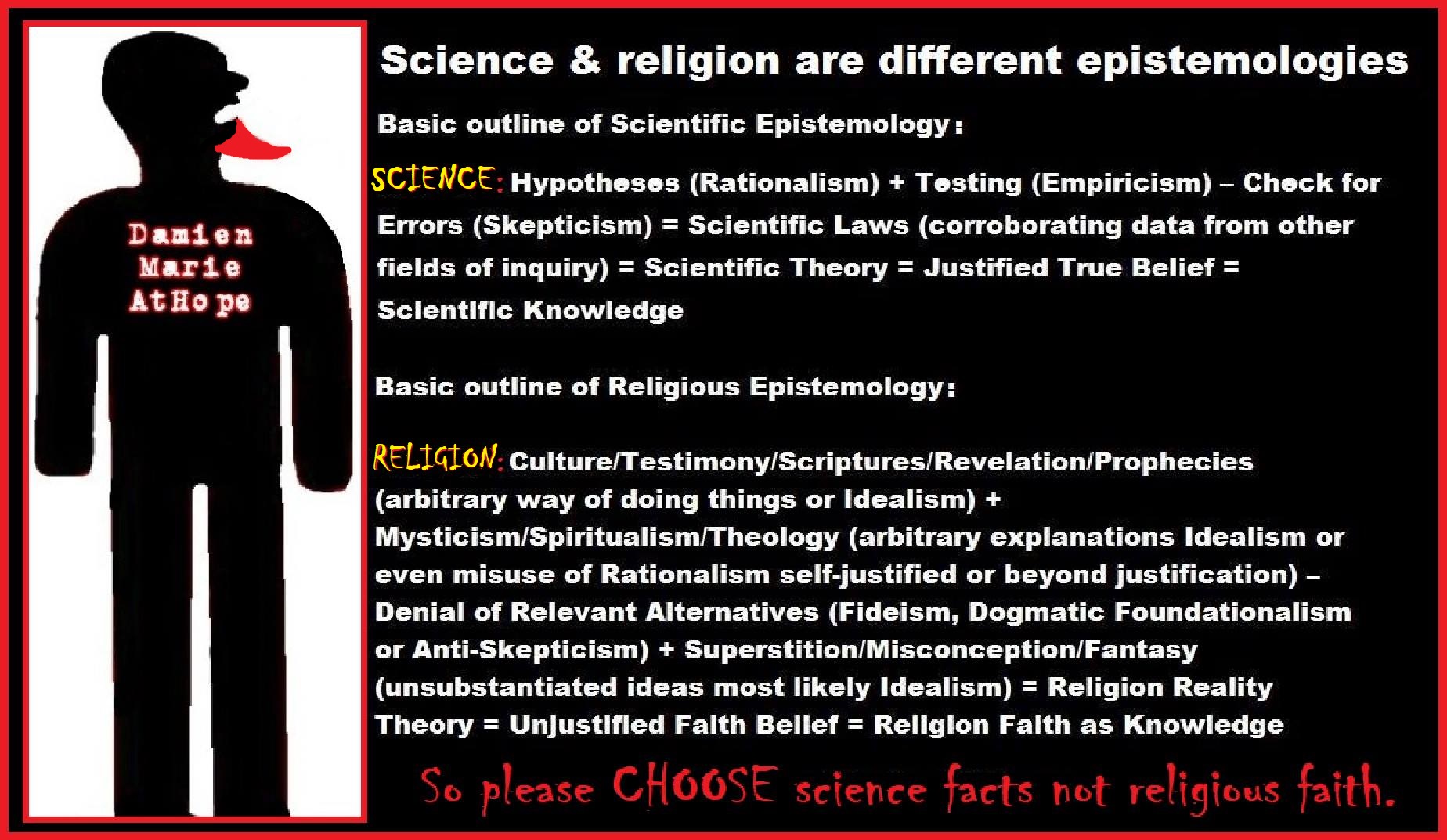
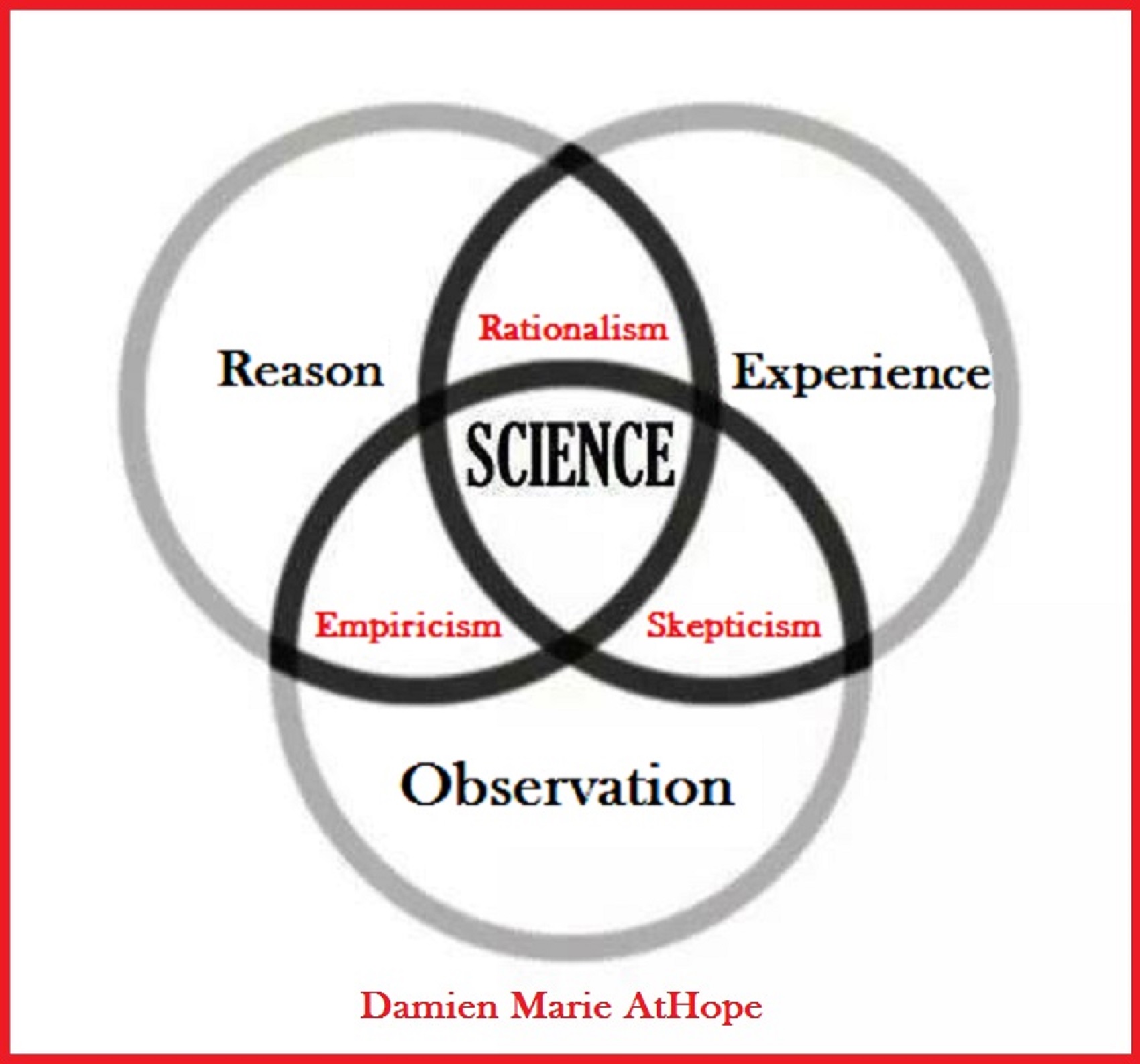
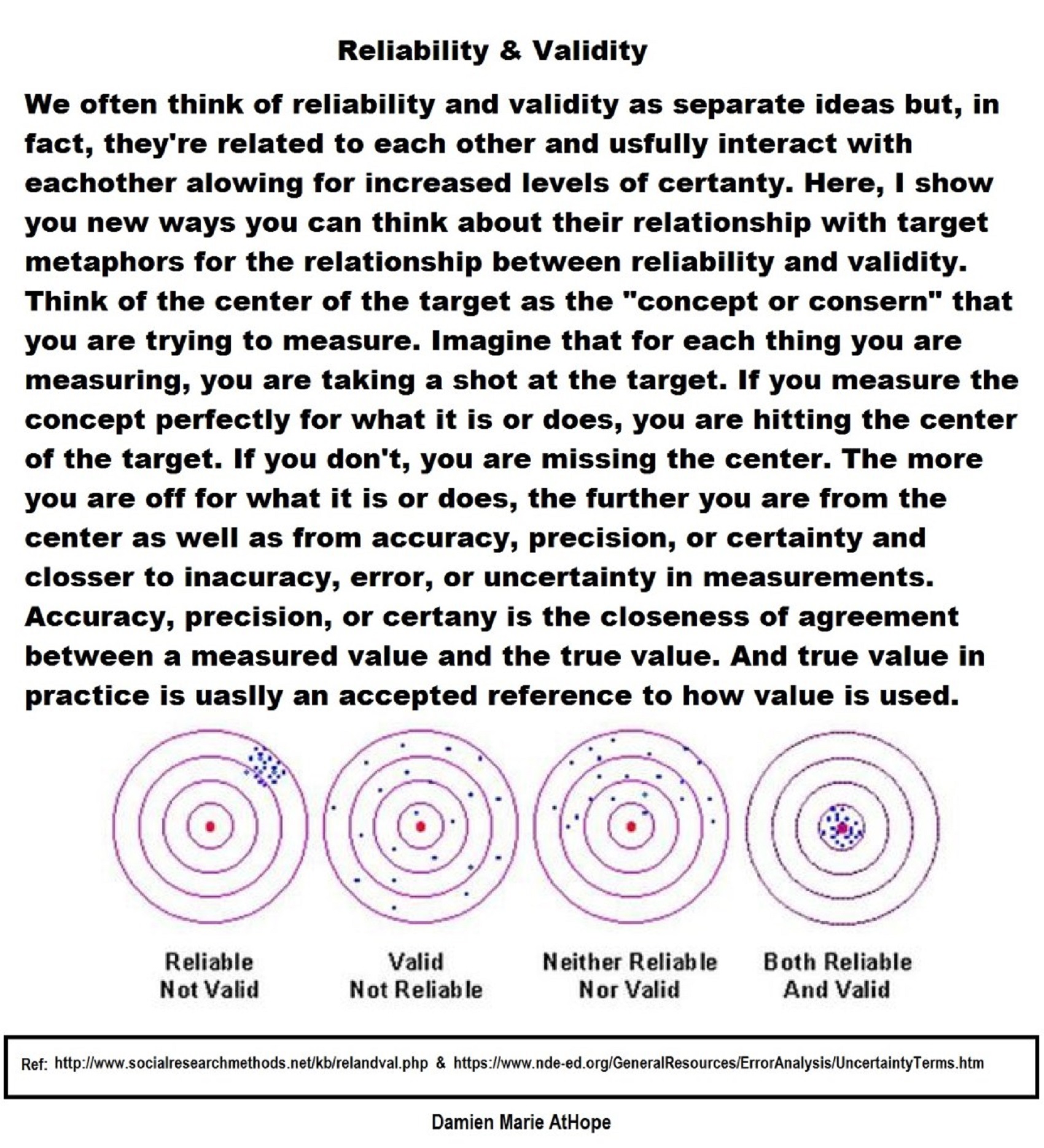
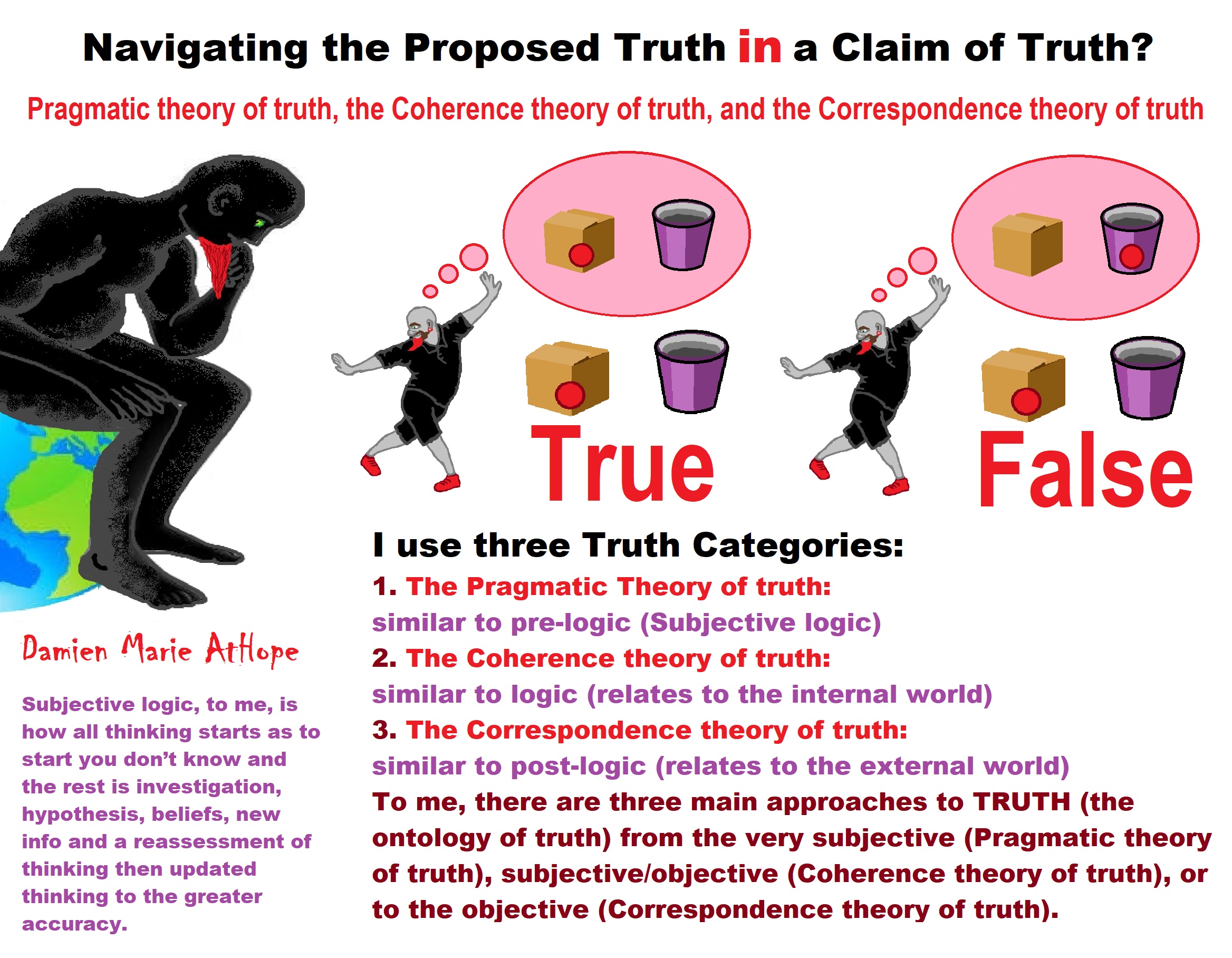
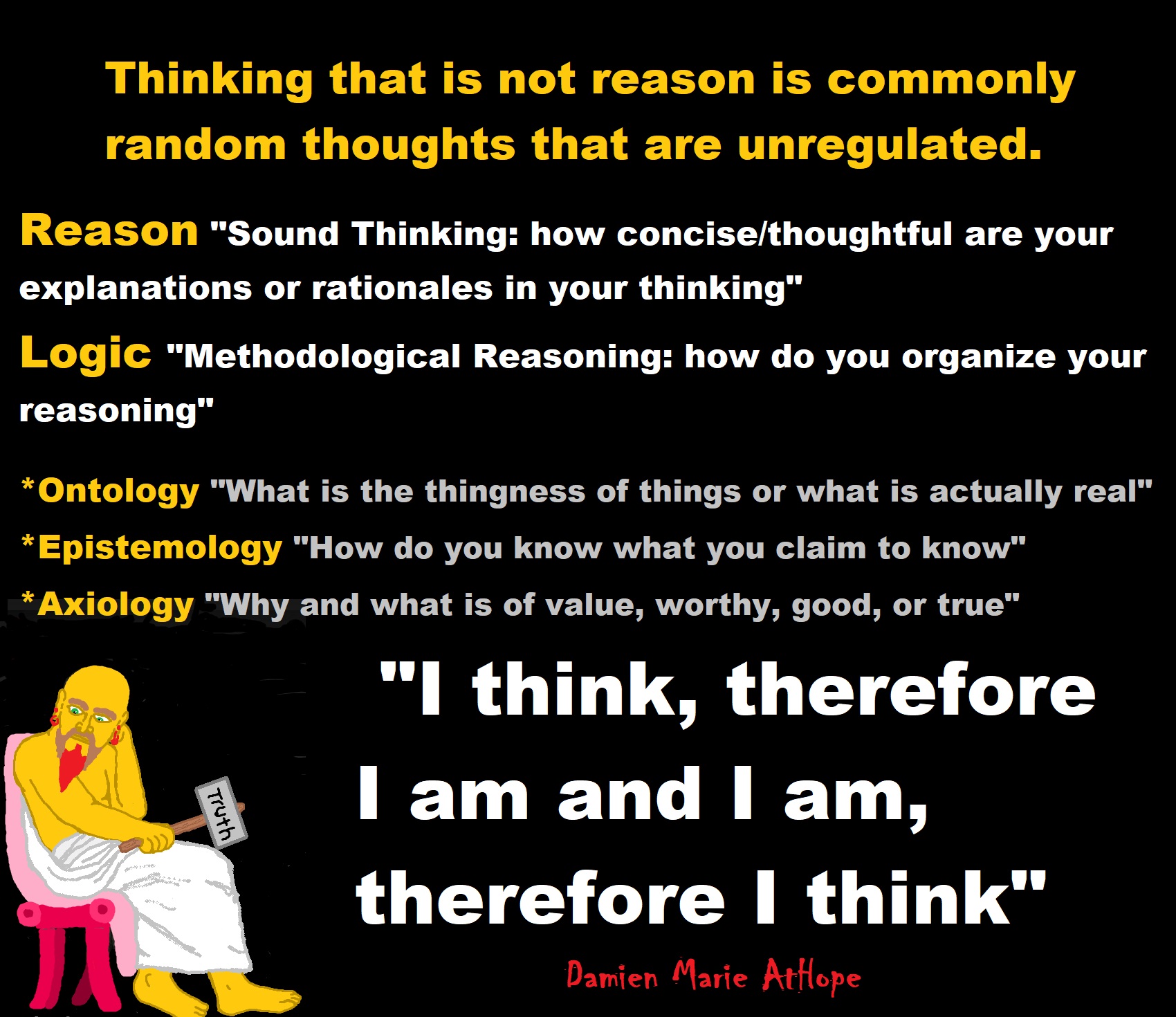
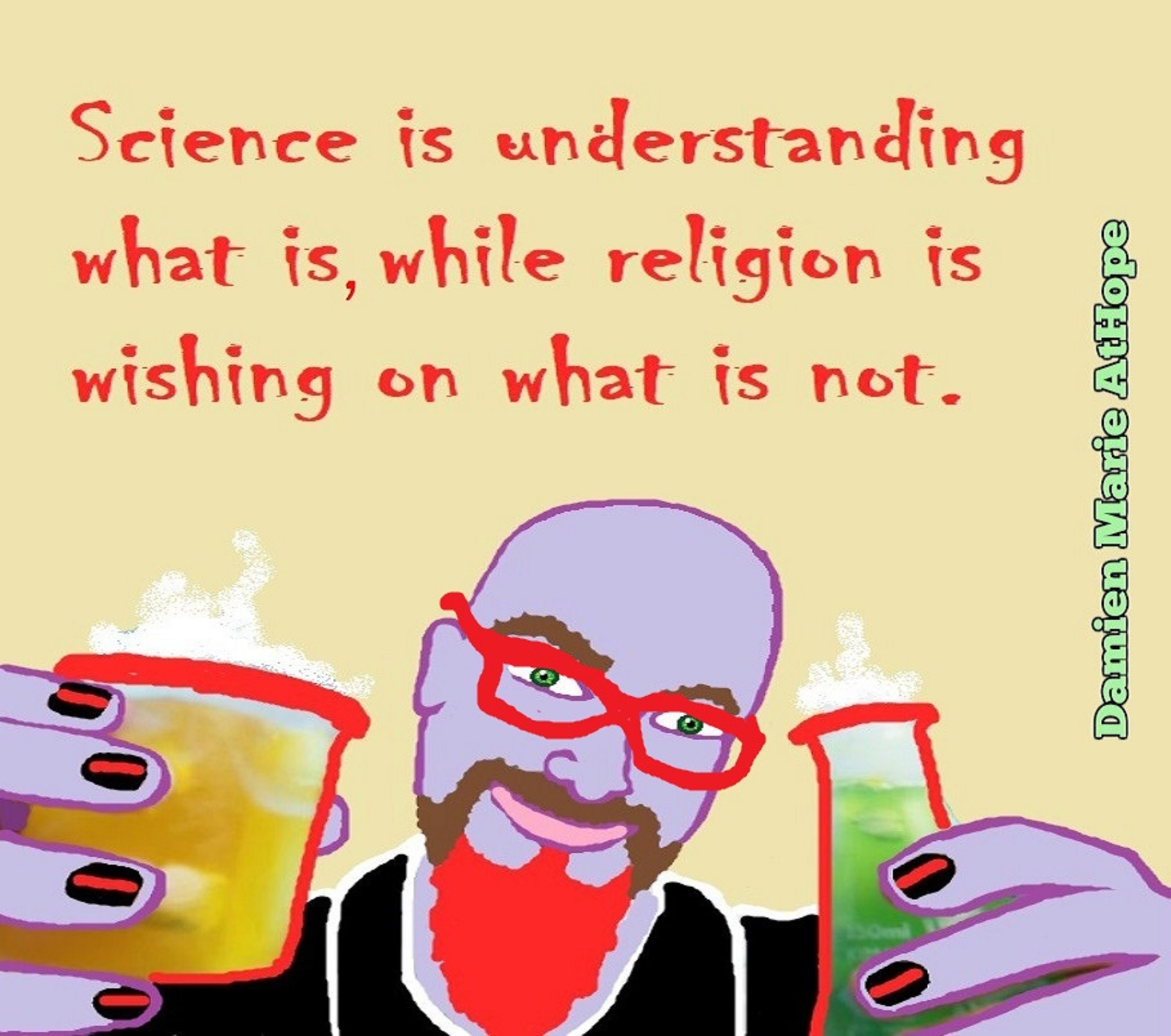
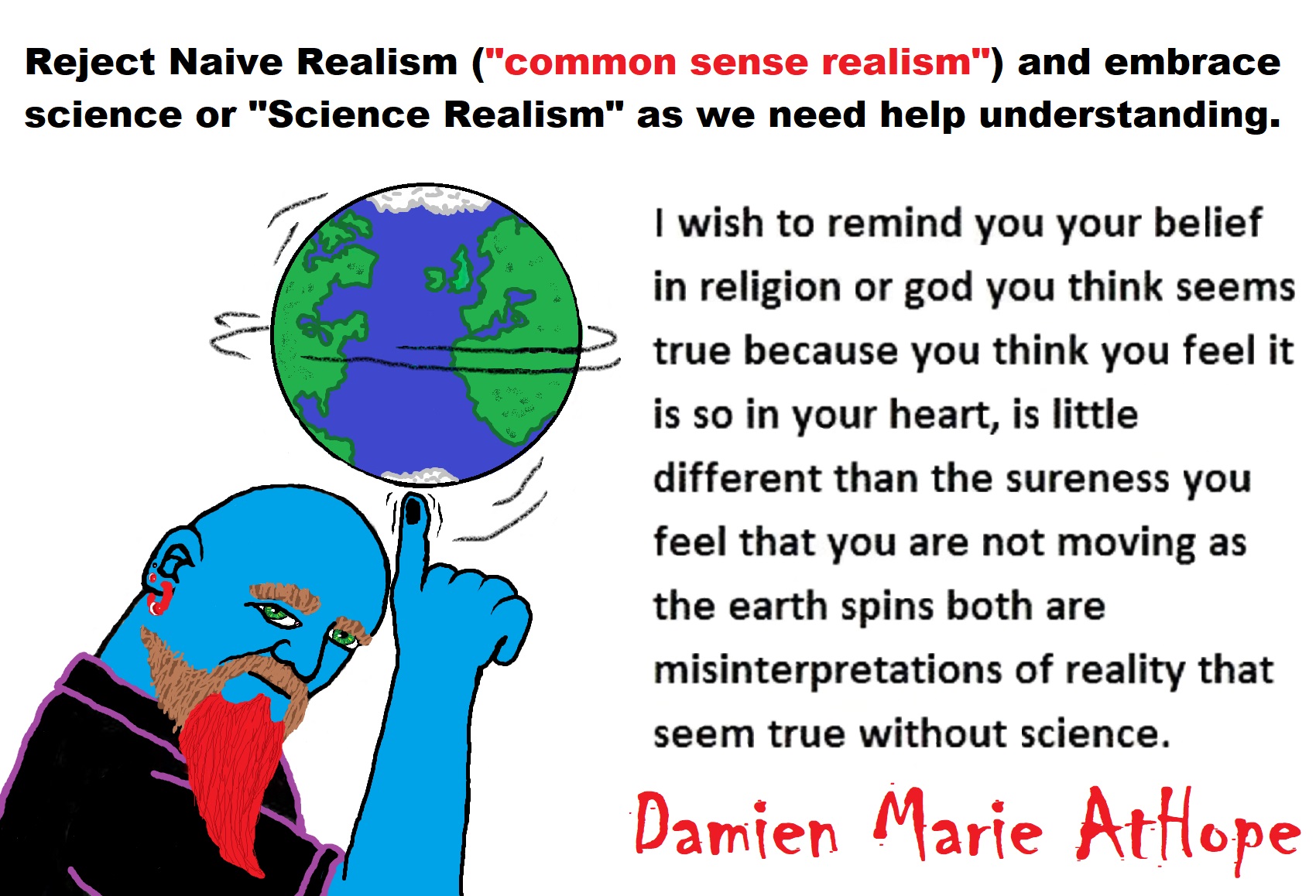
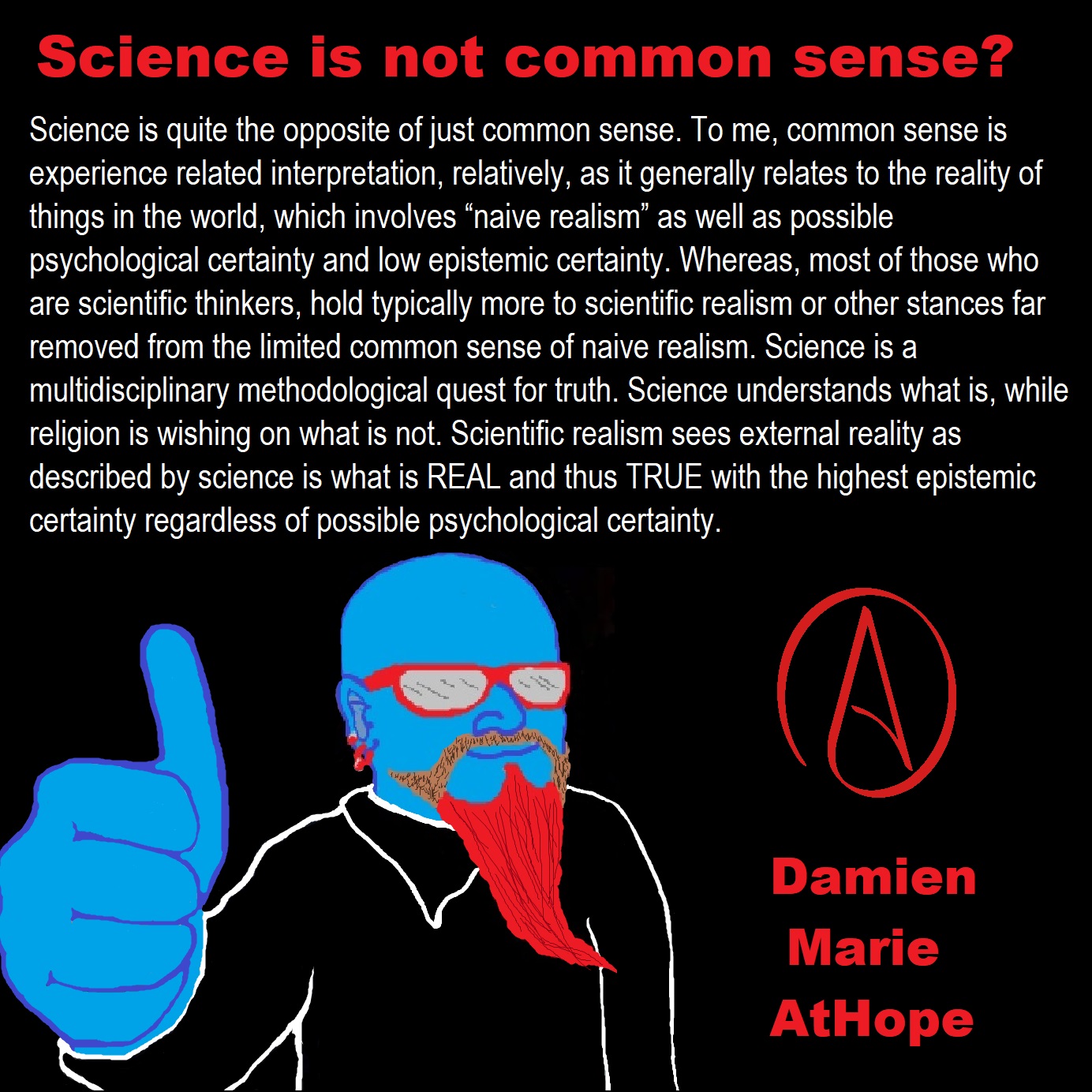
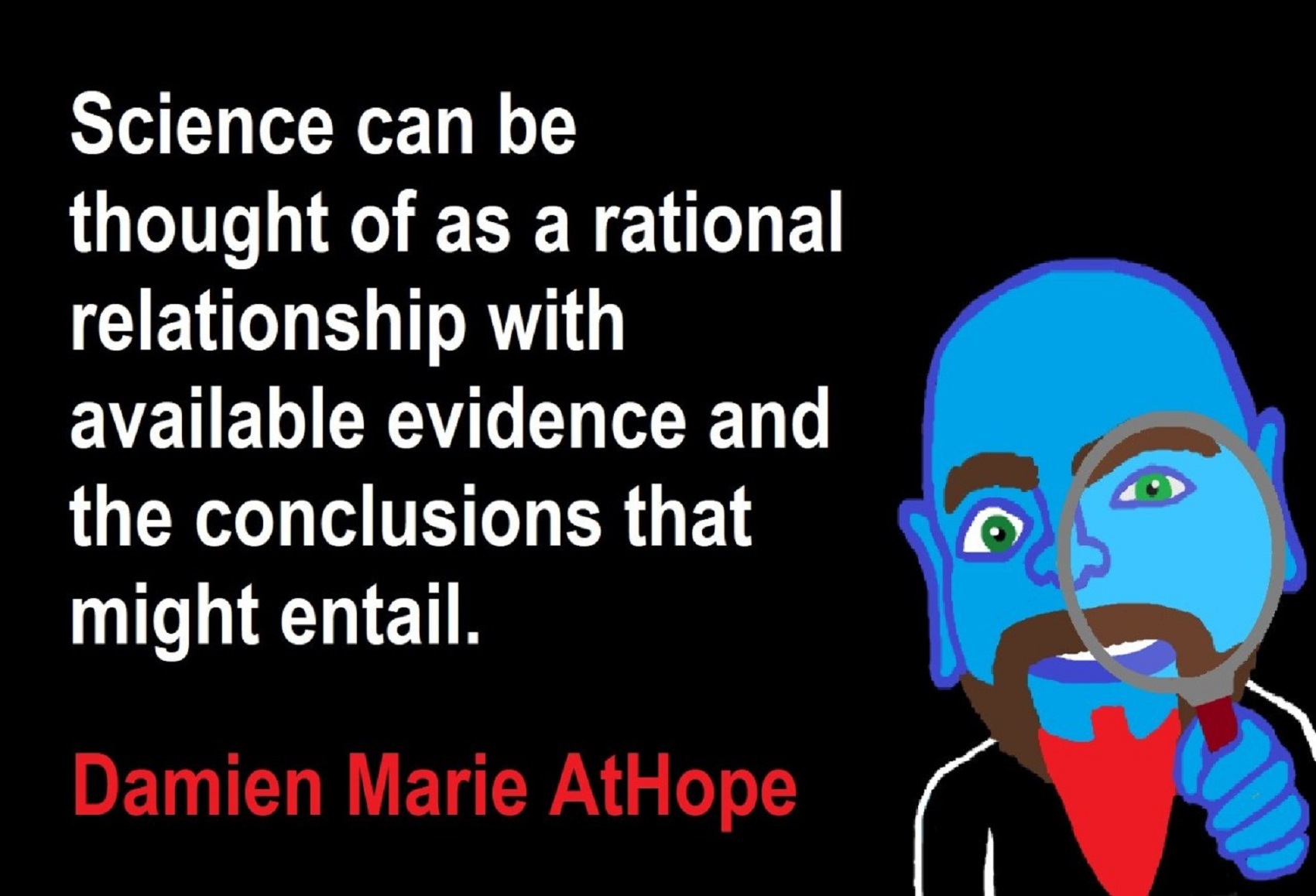
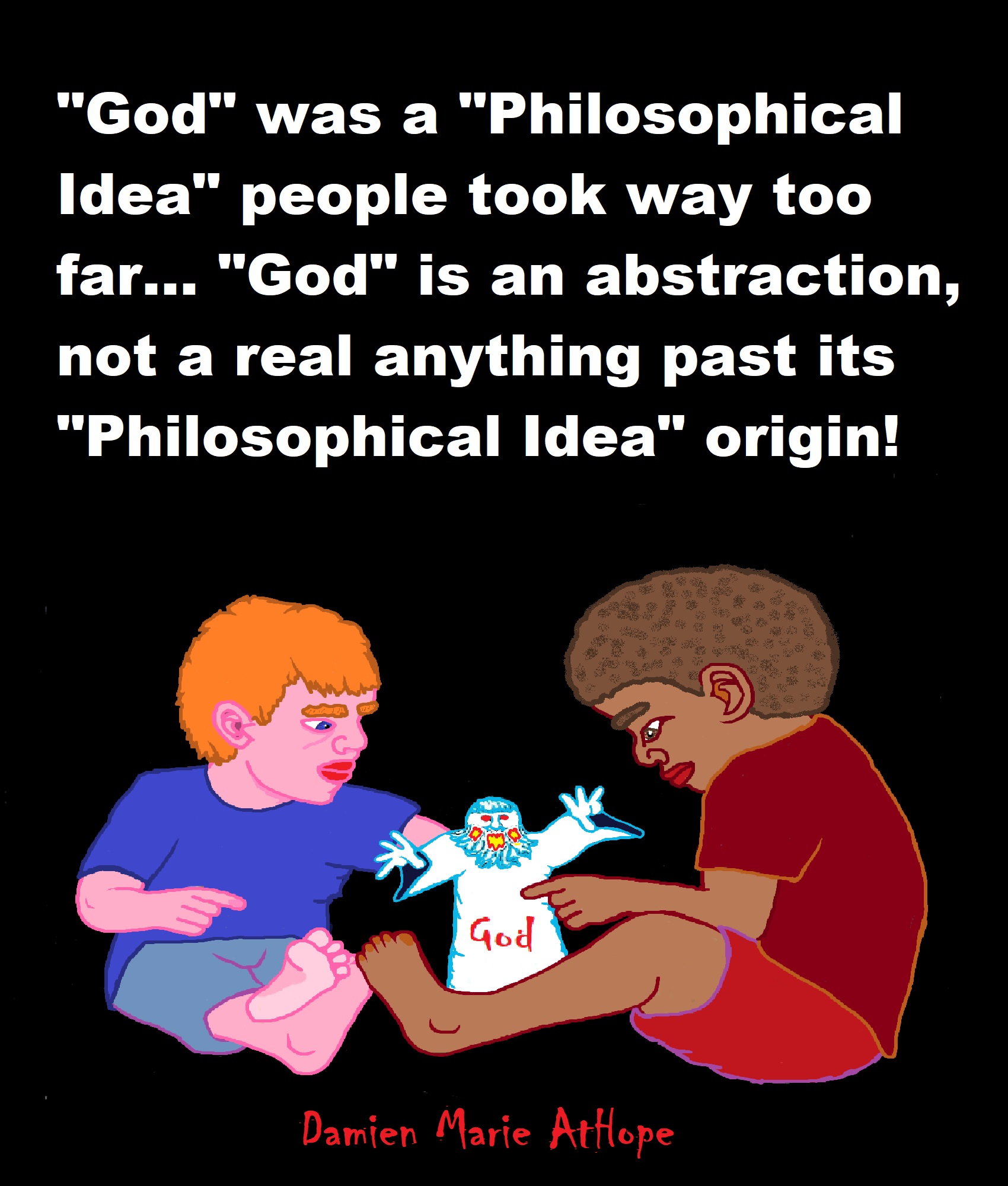
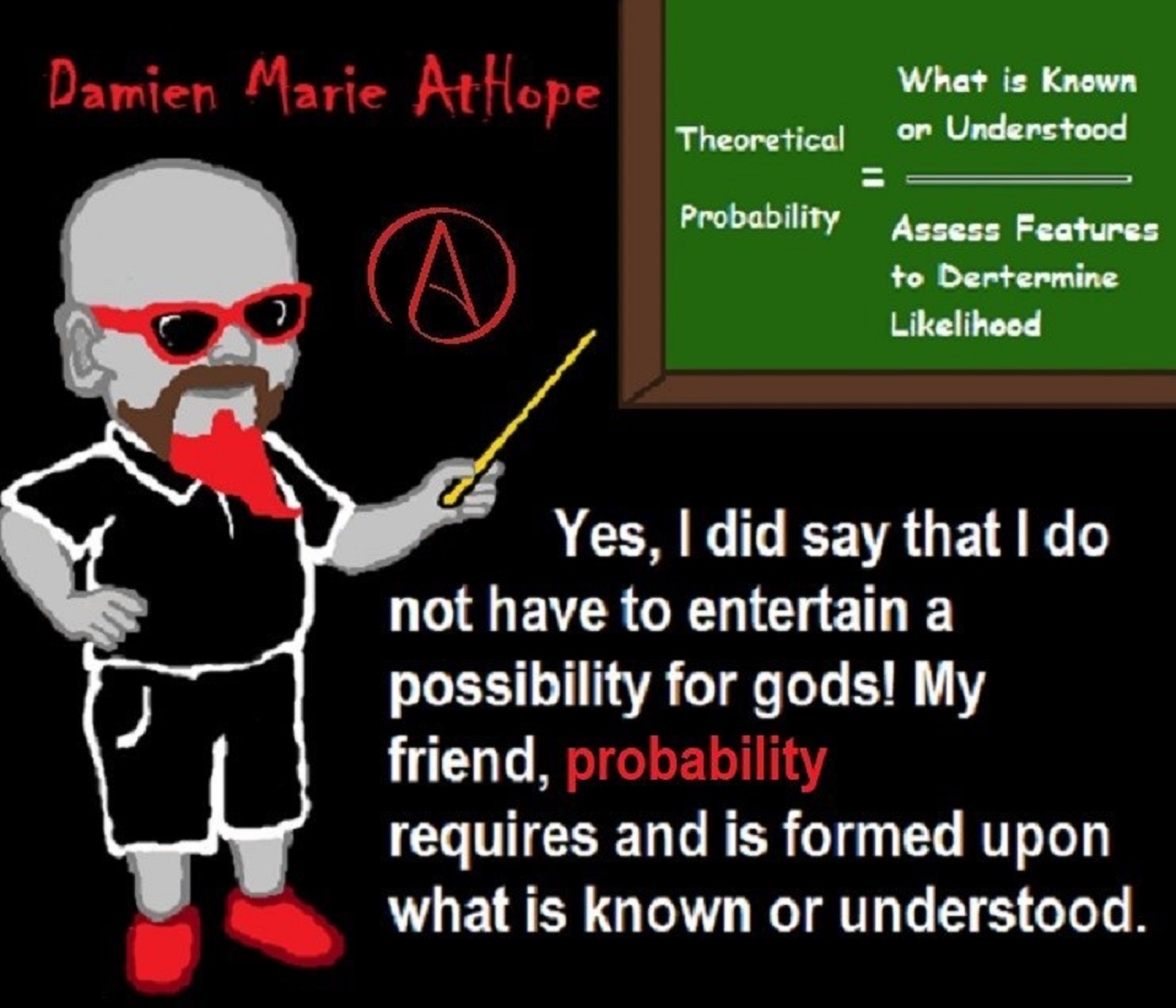
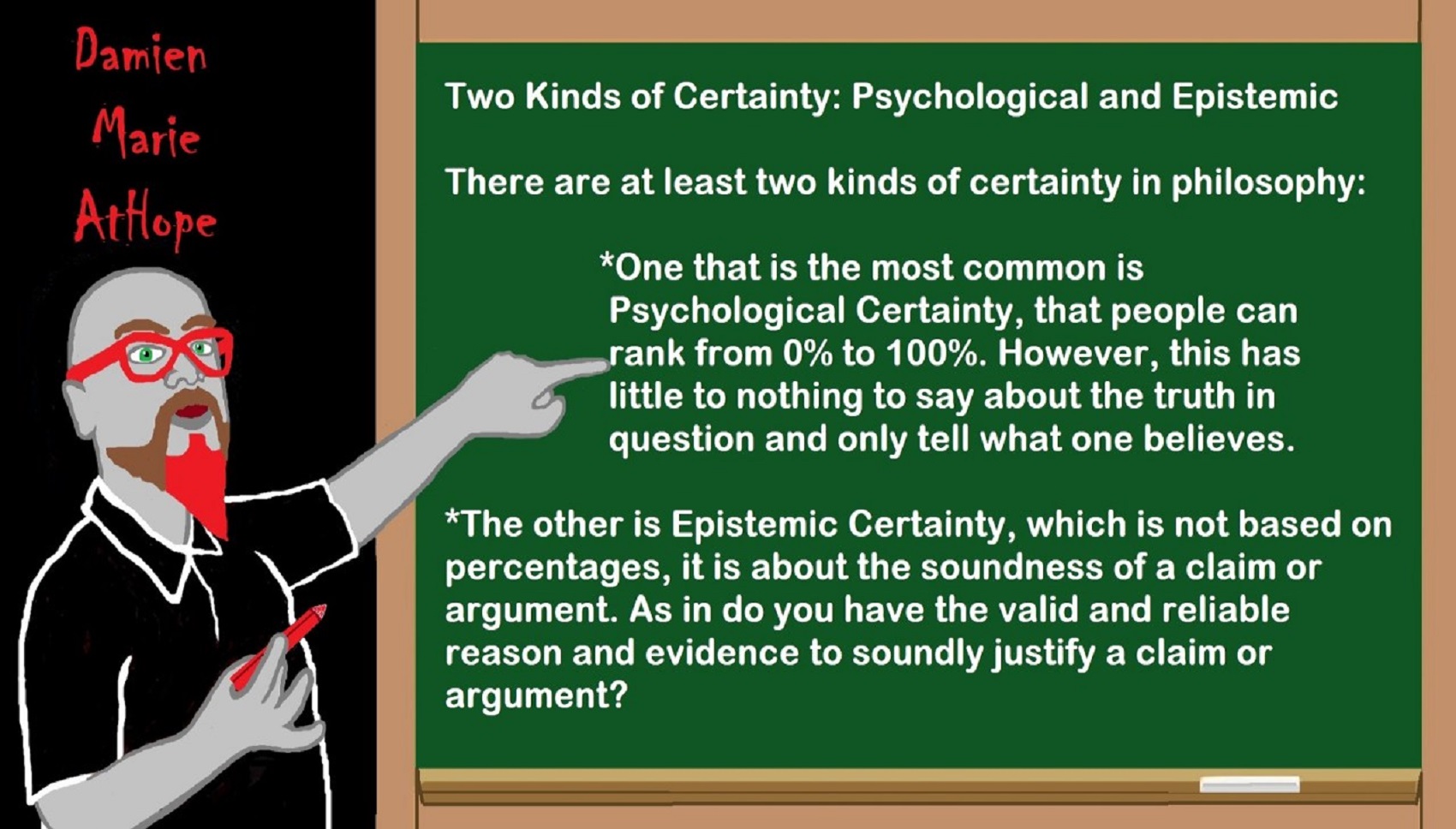
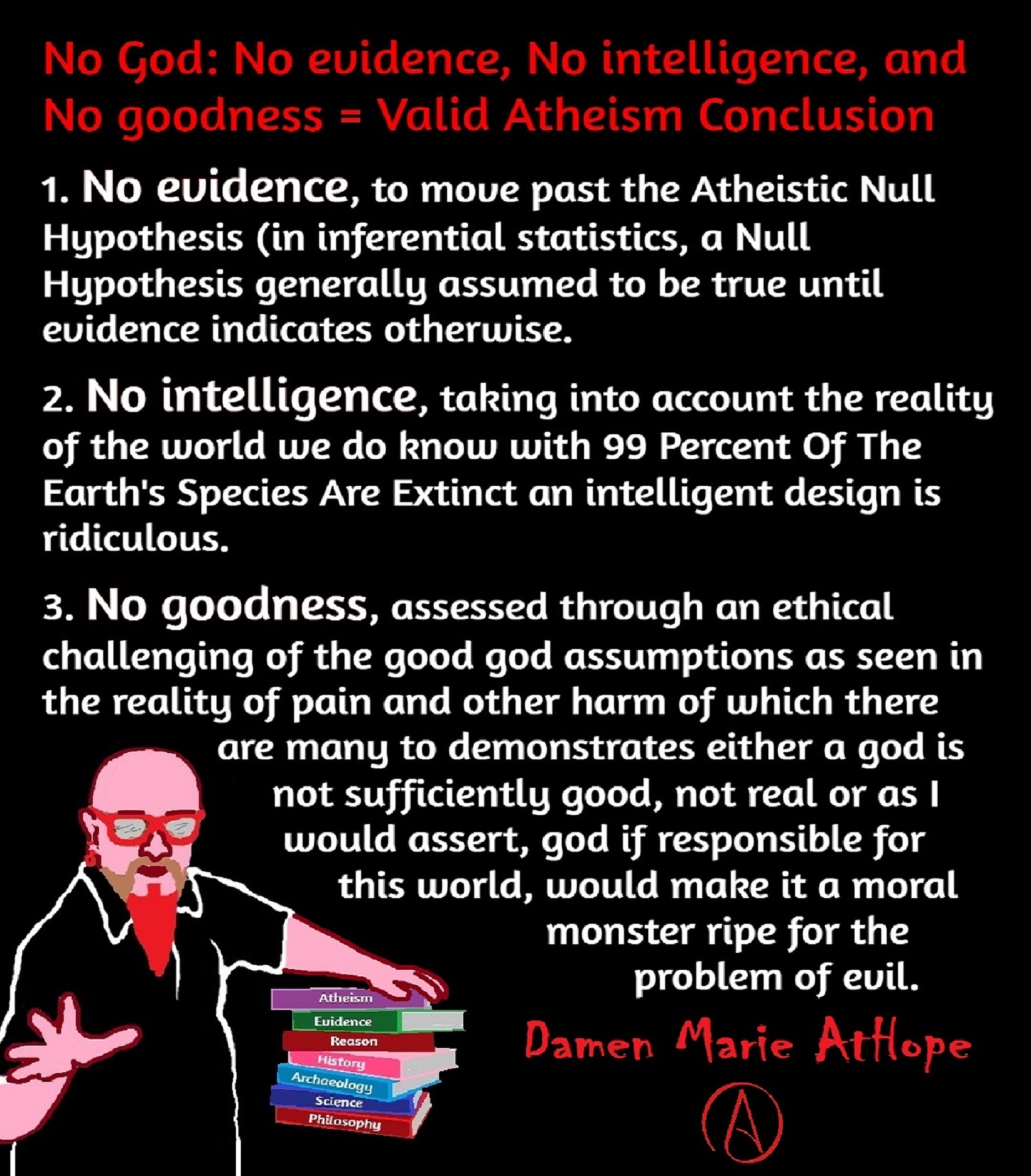
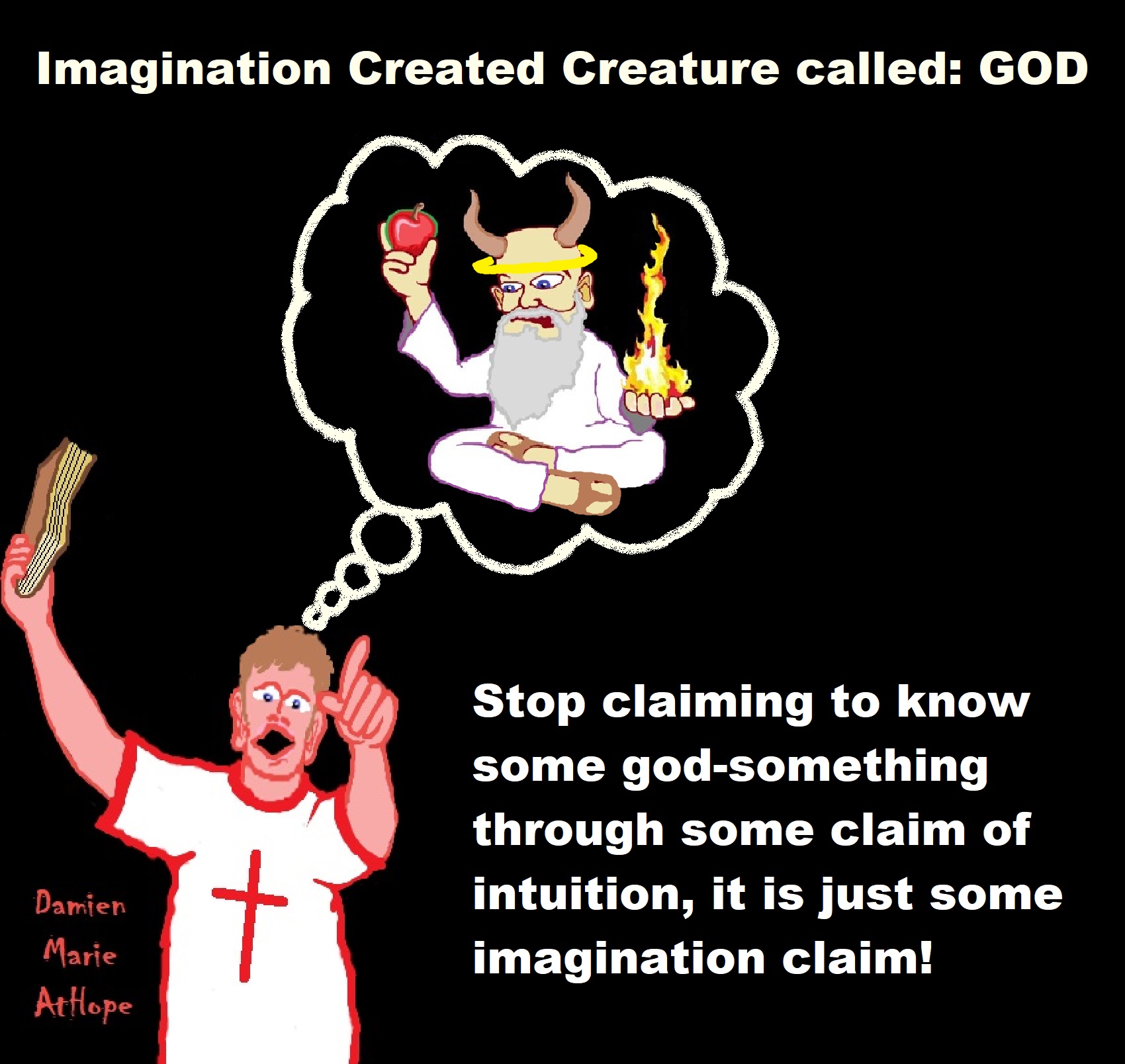
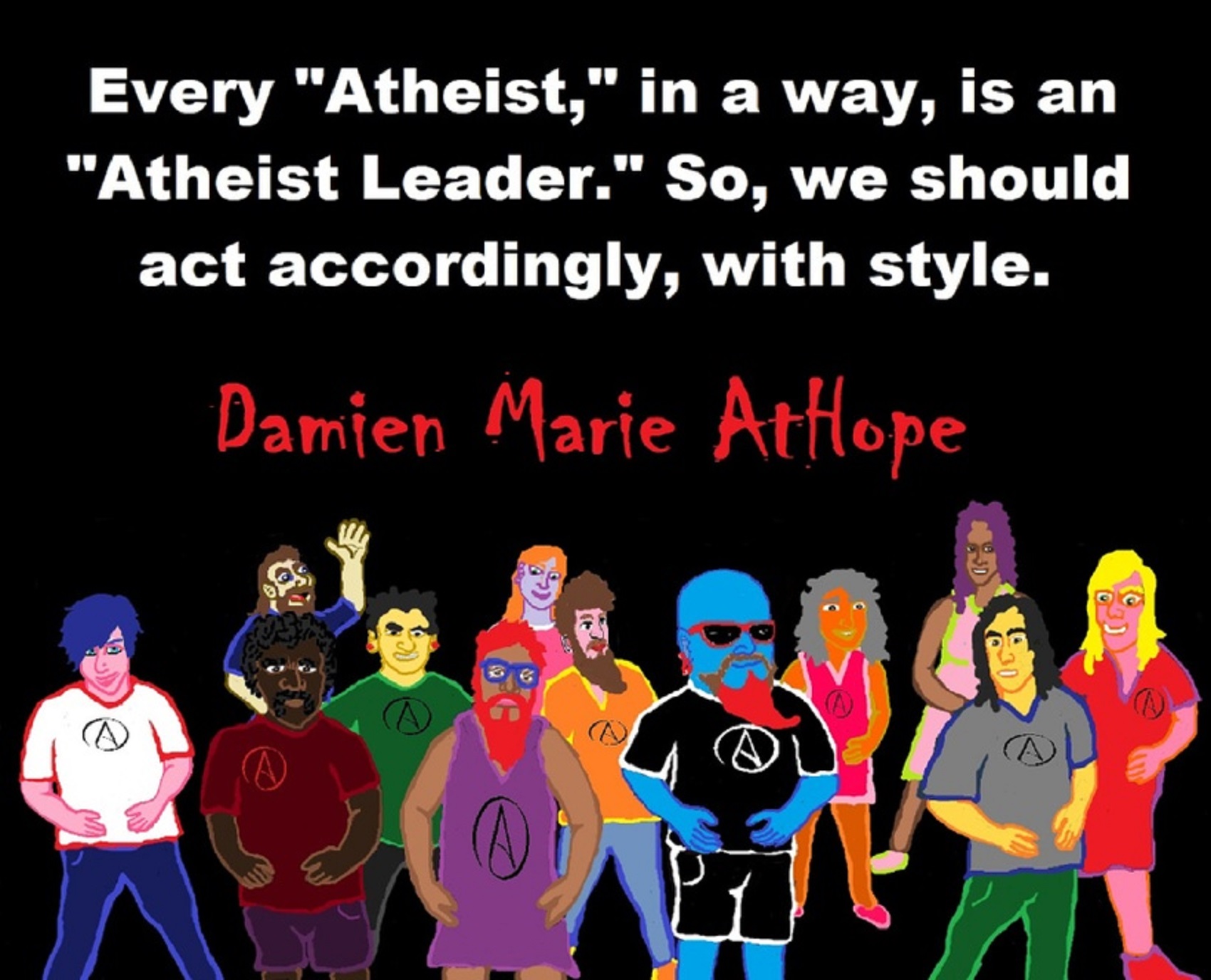

People don’t commonly teach religious history, even that of their own claimed religion. No, rather they teach a limited “pro their religion” history of their religion from a religious perspective favorable to the religion of choice.

Do you truly think “Religious Belief” is only a matter of some personal choice?
Do you not see how coercive one’s world of choice is limited to the obvious hereditary belief, in most religious choices available to the child of religious parents or caregivers? Religion is more commonly like a family, culture, society, etc. available belief that limits the belief choices of the child and that is when “Religious Belief” is not only a matter of some personal choice and when it becomes hereditary faith, not because of the quality of its alleged facts or proposed truths but because everyone else important to the child believes similarly so they do as well simply mimicking authority beliefs handed to them. Because children are raised in religion rather than being presented all possible choices but rather one limited dogmatic brand of “Religious Belief” where children only have a choice of following the belief as instructed, and then personally claim the faith hereditary belief seen in the confirming to the belief they have held themselves all their lives. This is obvious in statements asked and answered by children claiming a faith they barely understand but they do understand that their family believes “this or that” faith, so they feel obligated to believe it too. While I do agree that “Religious Belief” should only be a matter of some personal choice, it rarely is… End Hereditary Religion!

Animism: Respecting the Living World by Graham Harvey
“How have human cultures engaged with and thought about animals, plants, rocks, clouds, and other elements in their natural surroundings? Do animals and other natural objects have a spirit or soul? What is their relationship to humans? In this new study, Graham Harvey explores current and past animistic beliefs and practices of Native Americans, Maori, Aboriginal Australians, and eco-pagans. He considers the varieties of animism found in these cultures as well as their shared desire to live respectfully within larger natural communities. Drawing on his extensive casework, Harvey also considers the linguistic, performative, ecological, and activist implications of these different animisms.” ref
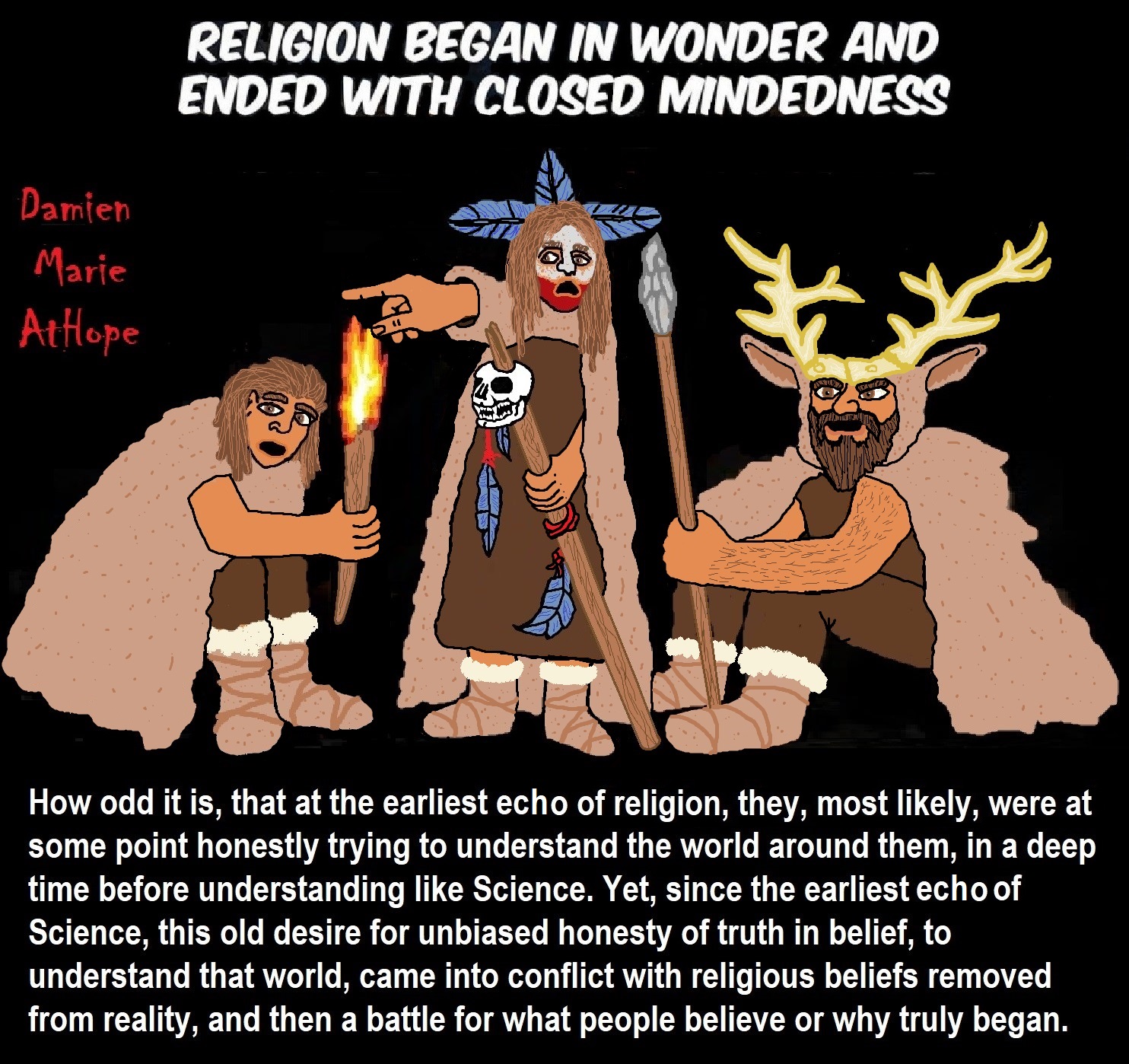
We are like believing machines we vacuum up ideas, like Velcro sticks to almost everything. We accumulate beliefs that we allow to negatively influence our lives, often without realizing it. Our willingness must be to alter skewed beliefs that impend our balance or reason, which allows us to achieve new positive thinking and accurate outcomes.

My thoughts on Religion Evolution with external links for more info:
- (Pre-Animism Africa mainly, but also Europe, and Asia at least 300,000 years ago), (Pre-Animism – Oxford Dictionaries)
- (Animism Africa around 100,000 years ago), (Animism – Britannica.com)
- (Totemism Europe around 50,000 years ago), (Totemism – Anthropology)
- (Shamanism Siberia around 30,000 years ago), (Shamanism – Britannica.com)
- (Paganism Turkey around 12,000 years ago), (Paganism – BBC Religion)
- (Progressed Organized Religion “Institutional Religion” Egypt around 5,000 years ago), (Ancient Egyptian Religion – Britannica.com)
- (CURRENT “World” RELIGIONS after 4,000 years ago) (Origin of Major Religions – Sacred Texts)
- (Early Atheistic Doubting at least by 2,600 years ago) (History of Atheism – Wikipedia)
“Religion is an Evolved Product” and Yes, Religion is Like Fear Given Wings…
Atheists talk about gods and religions for the same reason doctors talk about cancer, they are looking for a cure, or a firefighter talks about fires because they burn people and they care to stop them. We atheists too often feel a need to help the victims of mental slavery, held in the bondage that is the false beliefs of gods and the conspiracy theories of reality found in religions.
Understanding Religion Evolution:
- Pre-Animism (at least 300,000 years ago)
- Animism (Africa: 100,000 years ago)
- Totemism (Europe: 50,000 years ago)
- Shamanism (Siberia: 30,000 years ago)
- Paganism (Turkey: 12,000 years ago)
- Progressed organized religion (Egypt: 5,000 years ago), (Egypt, the First Dynasty 5,150 years ago)
- CURRENT “World” RELIGIONS (after 4,000 years ago)
- Early Atheistic Doubting (at least by 2,600 years ago)
“An Archaeological/Anthropological Understanding of Religion Evolution”
It seems ancient peoples had to survived amazing threats in a “dangerous universe (by superstition perceived as good and evil),” and human “immorality or imperfection of the soul” which was thought to affect the still living, leading to ancestor worship. This ancestor worship presumably led to the belief in supernatural beings, and then some of these were turned into the belief in gods. This feeble myth called gods were just a human conceived “made from nothing into something over and over, changing, again and again, taking on more as they evolve, all the while they are thought to be special,” but it is just supernatural animistic spirit-belief perceived as sacred.
Quick Evolution of Religion?
Pre-Animism (at least 300,000 years ago) pre-religion is a beginning that evolves into later Animism. So, Religion as we think of it, to me, all starts in a general way with Animism (Africa: 100,000 years ago) (theoretical belief in supernatural powers/spirits), then this is physically expressed in or with Totemism (Europe: 50,000 years ago) (theoretical belief in mythical relationship with powers/spirits through a totem item), which then enlists a full-time specific person to do this worship and believed interacting Shamanism (Siberia/Russia: 30,000 years ago) (theoretical belief in access and influence with spirits through ritual), and then there is the further employment of myths and gods added to all the above giving you Paganism (Turkey: 12,000 years ago) (often a lot more nature-based than most current top world religions, thus hinting to their close link to more ancient religious thinking it stems from). My hypothesis is expressed with an explanation of the building of a theatrical house (modern religions development). Progressed organized religion (Egypt: 5,000 years ago) with CURRENT “World” RELIGIONS (after 4,000 years ago).
Historically, in large city-state societies (such as Egypt or Iraq) starting around 5,000 years ago culminated to make religion something kind of new, a sociocultural-governmental-religious monarchy, where all or at least many of the people of such large city-state societies seem familiar with and committed to the existence of “religion” as the integrated life identity package of control dynamics with a fixed closed magical doctrine, but this juggernaut integrated religion identity package of Dogmatic-Propaganda certainly did not exist or if developed to an extent it was highly limited in most smaller prehistoric societies as they seem to lack most of the strong control dynamics with a fixed closed magical doctrine (magical beliefs could be at times be added or removed). Many people just want to see developed religious dynamics everywhere even if it is not. Instead, all that is found is largely fragments until the domestication of religion.
Religions, as we think of them today, are a new fad, even if they go back to around 6,000 years in the timeline of human existence, this amounts to almost nothing when seen in the long slow evolution of religion at least around 70,000 years ago with one of the oldest ritual worship. Stone Snake of South Africa: “first human worship” 70,000 years ago. This message of how religion and gods among them are clearly a man-made thing that was developed slowly as it was invented and then implemented peace by peace discrediting them all. Which seems to be a simple point some are just not grasping how devastating to any claims of truth when we can see the lie clearly in the archeological sites.
I wish people fought as hard for the actual values as they fight for the group/clan names political or otherwise they think support values. Every amount spent on war is theft to children in need of food or the homeless kept from shelter.
Here are several of my blog posts on history:
- To Find Truth You Must First Look
- (Magdalenian/Iberomaurusian) Connections to the First Paganists of the early Neolithic Near East Dating from around 17,000 to 12,000 Years Ago
- Natufians: an Ancient People at the Origins of Agriculture and Sedentary Life
- Possible Clan Leader/Special “MALE” Ancestor Totem Poles At Least 13,500 years ago?
- Jewish People with DNA at least 13,200 years old, Judaism, and the Origins of Some of its Ideas
- Baltic Reindeer Hunters: Swiderian, Lyngby, Ahrensburgian, and Krasnosillya cultures 12,020 to 11,020 years ago are evidence of powerful migratory waves during the last 13,000 years and a genetic link to Saami and the Finno-Ugric peoples.
- The Rise of Inequality: patriarchy and state hierarchy inequality
- Fertile Crescent 12,500 – 9,500 Years Ago: fertility and death cult belief system?
- 12,400 – 11,700 Years Ago – Kortik Tepe (Turkey) Pre/early-Agriculture Cultic Ritualism
- Ritualistic Bird Symbolism at Gobekli Tepe and its “Ancestor Cult”
- Male-Homosexual (female-like) / Trans-woman (female) Seated Figurine from Gobekli Tepe
- Could a 12,000-year-old Bull Geoglyph at Göbekli Tepe relate to older Bull and Female Art 25,000 years ago and Later Goddess and the Bull cults like Catal Huyuk?
- Sedentism and the Creation of goddesses around 12,000 years ago as well as male gods after 7,000 years ago.
- Alcohol, where Agriculture and Religion Become one? Such as Gobekli Tepe’s Ritualistic use of Grain as Food and Ritual Drink
- Neolithic Ritual Sites with T-Pillars and other Cultic Pillars
- Paganism: Goddesses around 12,000 years ago then Male Gods after 7,000 years ago
- First Patriarchy: Split of Women’s Status around 12,000 years ago & First Hierarchy: fall of Women’s Status around 5,000 years ago.
- Natufians: an Ancient People at the Origins of Agriculture and Sedentary Life
- J DNA and the Spread of Agricultural Religion (paganism)
- Paganism: an approximately 12,000-year-old belief system
- Paganism 12,000 years old: related to “Anarchism and Socialism” (Pre-Capitalism)
- Shaman burial in Israel 12,000 years ago and the Shamanism Phenomena
- Need to Mythicized: gods and goddesses
- 12,000 – 7,000 Years Ago – Paleo-Indian Culture (The Americas)
- 12,000 – 2,000 Years Ago – Indigenous-Scandinavians (Nordic)
- Norse did not wear helmets with horns?
- Pre-Pottery Neolithic Skull Cult around 11,500 to 8,400 Years Ago?
- 10,400 – 10,100 Years Ago, in Turkey the Nevail Cori Religious Settlement
- 9,000-6,500 Years Old Submerged Pre-Pottery/Pottery Neolithic Ritual Settlements off Israel’s Coast
- Catal Huyuk “first religious designed city” around 9,500 to 7,700 years ago (Turkey)
- Cultic Hunting at Catal Huyuk “first religious designed city”
- Special Items and Art as well as Special Elite Burials at Catal Huyuk
- New Rituals and Violence with the appearance of Pottery and People?
- Haplogroup N and its related Uralic Languages and Cultures
- Ainu people, Sámi people, Native Americans, the Ancient North Eurasians, and Paganistic-Shamanism with Totemism
- Ideas, Technology and People from Turkey, Europe, to China and Back again 9,000 to 5,000 years ago?
- First Pottery of Europe and the Related Cultures
- 9,000 years old Neolithic Artifacts Judean Desert and Hills Israel
- 9,000-7,000 years-old Sex and Death Rituals: Cult Sites in Israel, Jordan, and the Sinai
- 9,000-8500 year old Horned Female shaman Bad Dürrenberg Germany
- Neolithic Jewelry and the Spread of Farming in Europe Emerging out of West Turkey
- 8,600-year-old Tortoise Shells in Neolithic graves in central China have Early Writing and Shamanism
- Swing of the Mace: the rise of Elite, Forced Authority, and Inequality begin to Emerge 8,500 years ago?
- Migrations and Changing Europeans Beginning around 8,000 Years Ago
- My “Steppe-Anatolian-Kurgan hypothesis” 8,000/7,000 years ago
- Around 8,000-year-old Shared Idea of the Mistress of Animals, “Ritual” Motif
- Pre-Columbian Red-Paint (red ochre) Maritime Archaic Culture 8,000-3,000 years ago
- 7,522-6,522 years ago Linear Pottery culture which I think relates to Arcane Capitalism’s origins
- Arcane Capitalism: Primitive socialism, Primitive capital, Private ownership, Means of production, Market capitalism, Class discrimination, and Petite bourgeoisie (smaller capitalists)
- 7,500-4,750 years old Ritualistic Cucuteni-Trypillian culture of Moldova, Romania, and Ukraine
- Roots of a changing early society 7,200-6,700 years ago Jordan and Israel
- Agriculture religion (Paganism) with farming reached Britain between about 7,000 to 6,500 or so years ago and seemingly expressed in things like Western Europe’s Long Barrows
- My Thoughts on Possible Migrations of “R” DNA and Proto-Indo-European?
- “Millet” Spreading from China 7,022 years ago to Europe and related Language may have Spread with it leading to Proto-Indo-European
- Proto-Indo-European (PIE), ancestor of Indo-European languages: DNA, Society, Language, and Mythology
- The Dnieper–Donets culture and Asian varieties of Millet from China to the Black Sea region of Europe by 7,022 years ago
- Kurgan 6,000 years ago/dolmens 7,000 years ago: funeral, ritual, and other?
- 7,020 to 6,020-year-old Proto-Indo-European Homeland of Urheimat or proposed home of their Language and Religion
- Ancient Megaliths: Kurgan, Ziggurat, Pyramid, Menhir, Trilithon, Dolman, Kromlech, and Kromlech of Trilithons
- The Mytheme of Ancient North Eurasian Sacred-Dog belief and similar motifs are found in Indo-European, Native American, and Siberian comparative mythology
- Elite Power Accumulation: Ancient Trade, Tokens, Writing, Wealth, Merchants, and Priest-Kings
- Sacred Mounds, Mountains, Kurgans, and Pyramids may hold deep connections?
- Between 7,000-5,000 Years ago, rise of unequal hierarchy elite, leading to a “birth of the State” or worship of power, strong new sexism, oppression of non-elites, and the fall of Women’s equal status
- Paganism 7,000-5,000 years old: related to “Anarchism and Socialism” (Capitalism) (World War 0) Elite & their slaves
- Hell and Underworld mythologies starting maybe as far back as 7,000 to 5,000 years ago with the Proto-Indo-Europeans?
- The First Expression of the Male God around 7,000 years ago?
- White (light complexion skin) Bigotry and Sexism started 7,000 years ago?
- Around 7,000-year-old Shared Idea of the Divine Bird (Tutelary and/or Trickster spirit/deity), “Ritual” Motif
- Nekhbet an Ancient Egyptian Vulture Goddess and Tutelary Deity
- 6,720 to 4,920 years old Ritualistic Hongshan Culture of Inner Mongolia with 5,000-year-old Pyramid Mounds and Temples
- First proto-king in the Balkans, Varna culture around 6,500 years ago?
- 6,500–5,800 years ago in Israel Late Chalcolithic (Copper Age) Period in the Southern Levant Seems to Express Northern Levant Migrations, Cultural and Religious Transfer
- KING OF BEASTS: Master of Animals “Ritual” Motif, around 6,000 years old or older…
- Around 6000-year-old Shared Idea of the Solid Wheel & the Spoked Wheel-Shaped Ritual Motif
- “The Ghassulian Star,” a mysterious 6,000-year-old mural from Jordan; a Proto-Star of Ishtar, Star of Inanna or Star of Venus?
- Religious/Ritual Ideas, including goddesses and gods as well as ritual mounds or pyramids from Northeastern Asia at least 6,000 years old, seemingly filtering to Iran, Iraq, the Mediterranean, Europe, Egypt, and the Americas?
- Maykop (5,720–5,020 years ago) Caucasus region Bronze Age culture-related to Copper Age farmers from the south, influenced by the Ubaid period and Leyla-Tepe culture, as well as influencing the Kura-Araxes culture
- 5-600-year-old Tomb, Mummy, and First Bearded Male Figurine in a Grave
- Kura-Araxes Cultural 5,520 to 4,470 years old DNA traces to the Canaanites, Arabs, and Jews
- Minoan/Cretan (Keftiu) Civilization and Religion around 5,520 to 3,120 years ago
- Evolution Of Science at least by 5,500 years ago
- 5,500 Years old birth of the State, the rise of Hierarchy, and the fall of Women’s status
- “Jiroft culture” 5,100 – 4,200 years ago and the History of Iran
- Stonehenge: Paganistic Burial and Astrological Ritual Complex, England (5,100-3,600 years ago)
- Around 5,000-year-old Shared Idea of the “Tree of Life” Ritual Motif
- Complex rituals for elite, seen from China to Egypt, at least by 5,000 years ago
- Around 5,000 years ago: “Birth of the State” where Religion gets Military Power and Influence
- The Center of the World “Axis Mundi” and/or “Sacred Mountains” Mythology Could Relate to the Altai Mountains, Heart of the Steppe
- Progressed organized religion starts, an approximately 5,000-year-old belief system
- China’s Civilization between 5,000-3,000 years ago, was a time of war and class struggle, violent transition from free clans to a Slave or Elite society
- Origin of Logics is Naturalistic Observation at least by around 5,000 years ago.
- Paganism 5,000 years old: progressed organized religion and the state: related to “Anarchism and Socialism” (Kings and the Rise of the State)
- Ziggurats (multi-platform temples: 4,900 years old) to Pyramids (multi-platform tombs: 4,700 years old)
- Did a 4,520–4,420-year-old Volcano In Turkey Inspire the Bible God?
- Finland’s Horned Shaman and Pre-Horned-God at least 4,500 years ago?
- 4,000-year-Old Dolmens in Israel: A Connected Dolmen Religious Phenomenon?
- Creation myths: From chaos, Ex nihilo, Earth-diver, Emergence, World egg, and World parent
- Bronze Age “Ritual” connections of the Bell Beaker culture with the Corded Ware/Single Grave culture, which were related to the Yamnaya culture and Proto-Indo-European Languages/Religions
- Low Gods (Earth/ Tutelary deity), High Gods (Sky/Supreme deity), and Moralistic Gods (Deity enforcement/divine order)
- The exchange of people, ideas, and material-culture including, to me, the new god (Sky Father) and goddess (Earth Mother) religion between the Cucuteni-Trypillians and others which is then spread far and wide
- Koryaks: Indigenous People of the Russian Far East and Big Raven myths also found in Tlingit, Haida, Tsimshian, and other Indigenous People of North America
- 42 Principles Of Maat (Egyptian Goddess of the justice) around 4,400 years ago, 2000 Years Before Ten Commandments
- “Happy Easter” Well Happy Eostre/Ishter
- 4,320-3,820 years old “Shimao” (North China) site with Totemistic-Shamanistic Paganism and a Stepped Pyramid
- 4,250 to 3,400 Year old Stonehenge from Russia: Arkaim?
- 4,100-year-old beaker with medicinal & flowering plants in a grave of a woman in Scotland
- Early European Farmer ancestry, Kelif el Boroud people with the Cardial Ware culture, and the Bell Beaker culture Paganists too, spread into North Africa, then to the Canary Islands off West Africa
- Flood Accounts: Gilgamesh epic (4,100 years ago) Noah in Genesis (2,600 years ago)
- Paganism 4,000 years old: related to “Anarchism and Socialism” (First Moralistic gods, then the Origin time of Monotheism)
- When was the beginning: TIMELINE OF CURRENT RELIGIONS, which start around 4,000 years ago.
- Early Religions Thought to Express Proto-Monotheistic Systems around 4,000 years ago
- Kultepe? An archaeological site with a 4,000 years old women’s rights document.
- Single God Religions (Monotheism) = “Man-o-theism” started around 4,000 years ago with the Great Sky Spirit/God Tiān (天)?
- Confucianism’s Tiān (Shangdi god 4,000 years old): Supernaturalism, Pantheism or Theism?
- Yes, Your Male God is Ridiculous
- Mythology, a Lunar Deity is a Goddess or God of the Moon
- Sacred Land, Hills, and Mountains: Sami Mythology (Paganistic Shamanism)
- Horse Worship/Sacrifice: mythical union of Ruling Elite/Kingship and the Horse
- The Amorite/Amurru people’s God Amurru “Lord of the Steppe”, relates to the Origins of the Bible God?
- Bronze Age Exotic Trade Routes Spread Quite Far as well as Spread Religious Ideas with Them
- Sami and the Northern Indigenous Peoples Landscape, Language, and its Connection to Religion
- Prototype of Ancient Analemmatic Sundials around 3,900-3,150 years ago and a Possible Solar Connection to gods?
- Judaism is around 3,450 or 3,250 years old. (“Paleo-Hebrew” 3,000 years ago and Torah 2,500 years ago)
- The Weakening of Ancient Trade and the Strengthening of Religions around 3000 years ago?
- Are you aware that there are religions that worship women gods, explain now religion tears women down?
- Animistic, Totemistic, and Paganistic Superstition Origins of bible god and the bible’s Religion.
- Myths and Folklore: “Trickster gods and goddesses”
- Jews, Judaism, and the Origins of Some of its Ideas
- An Old Branch of Religion Still Giving Fruit: Sacred Trees
- Dating the BIBLE: naming names and telling times (written less than 3,000 years ago, provable to 2,200 years ago)
- Did a Volcano Inspire the bible god?
- Dené–Yeniseian language, Old Copper Complex, and Pre-Columbian Mound Builders?
- No “dinosaurs and humans didn’t exist together just because some think they are in the bible itself”
- Sacred Shit and Sacred Animals?
- Everyone Killed in the Bible Flood? “Nephilim” (giants)?
- Hey, Damien dude, I have a question for you regarding “the bible” Exodus.
- Archaeology Disproves the Bible
- Bible Battle, Just More, Bible Babble
- The Jericho Conquest lie?
- Canaanites and Israelites?
- Accurate Account on how did Christianity Began?
- Let’s talk about Christianity.
- So the 10 commandments isn’t anything to go by either right?
- Misinformed christian
- Debunking Jesus?
- Paulism vs Jesus
- Ok, you seem confused so let’s talk about Buddhism.
- Unacknowledged Buddhism: Gods, Savior, Demons, Rebirth, Heavens, Hells, and Terrorism
- His Foolishness The Dalai Lama
- Yin and Yang is sexist with an ORIGIN around 2,300 years ago?
- I Believe Archaeology, not Myths & Why Not, as the Religious Myths Already Violate Reason!
- Archaeological, Scientific, & Philosophic evidence shows the god myth is man-made nonsense.
- Aquatic Ape Theory/Hypothesis? As Always, Just Pseudoscience.
- Ancient Aliens Conspiracy Theorists are Pseudohistorians
- The Pseudohistoric and Pseudoscientific claims about “Bakoni Ruins” of South Africa
- Why do people think Religion is much more than supernaturalism and superstitionism?
- Religion is an Evolved Product
- Was the Value of Ancient Women Different?
- 1000 to 1100 CE, human sacrifice Cahokia Mounds a pre-Columbian Native American site
- Feminist atheists as far back as the 1800s?
- Promoting Religion as Real is Mentally Harmful to a Flourishing Humanity
- Screw All Religions and Their Toxic lies, they are all fraud
- Forget Religions’ Unfounded Myths, I Have Substantiated “Archaeology Facts.”
- Religion Dispersal throughout the World
- I Hate Religion Just as I Hate all Pseudoscience
- Exposing Scientology, Eckankar, Wicca and Other Nonsense?
- Main deity or religious belief systems
- Quit Trying to Invent Your God From the Scraps of Science.
- Archaeological, Scientific, & Philosophic evidence shows the god myth is man-made nonsense.
- Ancient Alien Conspiracy Theorists: Misunderstanding, Rhetoric, Misinformation, Fabrications, and Lies
- Misinformation, Distortion, and Pseudoscience in Talking with a Christian Creationist
- Judging the Lack of Goodness in Gods, Even the Norse God Odin
- Challenging the Belief in God-like Aliens and Gods in General
- A Challenge to Christian use of Torture Devices?
- Yes, Hinduism is a Religion
- Trump is One of the Most Reactionary Forces of Far-right Christian Extremism
- Was the Bull Head a Symbol of God? Yes!
- Primate Death Rituals
- Christian – “God and Christianity are objectively true”
- Australopithecus afarensis Death Ritual?
- You Claim Global Warming is a Hoax?
- Doubter of Science and Defamer of Atheists?
- I think that sounds like the Bible?
- History of the Antifa (“anti-fascist”) Movements
- Indianapolis Anti-Blasphemy Laws #Free Soheil Rally
- Damien, you repeat the golden rule in so many forms then you say religion is dogmatic?
- Science is a Trustable Methodology whereas Faith is not Trustable at all!
- Was I ever a believer, before I was an atheist?
- Atheists rise in reason
- Mistrust of science?
- Open to Talking About the Definition of ‘God’? But first, we address Faith.
- ‘United Monarchy’ full of splendor and power – Saul, David, and Solomon? Most likely not.
- Is there EXODUS ARCHAEOLOGY? The short answer is “no.”
- Lacking Proof of Bigfoots, Unicorns, and Gods is Just a Lack of Research?
- Religion and Politics: Faith Beliefs vs. Rational Thinking
- Hammer of Truth that lying pig RELIGION: challenged by an archaeologist
- “The Hammer of Truth” -ontology question- What do You Mean by That?
- Navigation of a bad argument: Ad Hominem vs. Attack
- Why is it Often Claimed that Gods have a Gender?
- Why are basically all monotheistic religions ones that have a male god?
- Shifting through the Claims in support of Faith
- Dear Mr. AtHope, The 20th Century is an Indictment of Secularism and a Failed Atheist Century
- An Understanding of the Worldwide Statistics and Dynamics of Terrorist Incidents and Suicide Attacks
- Intoxication and Evolution? Addressing and Assessing the “Stoned Ape” or “Drunken Monkey” Theories as Catalysts in Human Evolution
- Sacred Menstrual cloth? Inanna’s knot, Isis knot, and maybe Ma’at’s feather?
- Damien, why don’t the Hebrews accept the bible stories?
- Dealing with a Troll and Arguing Over Word Meaning
- Knowledge without Belief? Justified beliefs or disbeliefs worthy of Knowledge?
- Afrocentrism and African Religions
- Crecganford @crecganford offers history & stories of the people, places, gods, & culture
- Empiricism-Denier?
I am not an academic. I am a revolutionary that teaches in public, in places like social media, and in the streets. I am not a leader by some title given but from my commanding leadership style of simply to start teaching everywhere to everyone, all manner of positive education.

ref, ref, ref, ref, ref, ref, ref, ref, ref, ref, ref, ref, ref, ref, ref, ref, ref, ref, ref, ref, ref
Low Gods “Earth” or Tutelary deity and High Gods “Sky” or Supreme deity
“An Earth goddess is a deification of the Earth. Earth goddesses are often associated with the “chthonic” deities of the underworld. Ki and Ninhursag are Mesopotamian earth goddesses. In Greek mythology, the Earth is personified as Gaia, corresponding to Roman Terra, Indic Prithvi/Bhūmi, etc. traced to an “Earth Mother” complementary to the “Sky Father” in Proto-Indo-European religion. Egyptian mythology exceptionally has a sky goddess and an Earth god.” ref
“A mother goddess is a goddess who represents or is a personification of nature, motherhood, fertility, creation, destruction or who embodies the bounty of the Earth. When equated with the Earth or the natural world, such goddesses are sometimes referred to as Mother Earth or as the Earth Mother. In some religious traditions or movements, Heavenly Mother (also referred to as Mother in Heaven or Sky Mother) is the wife or feminine counterpart of the Sky father or God the Father.” ref
“Any masculine sky god is often also king of the gods, taking the position of patriarch within a pantheon. Such king gods are collectively categorized as “sky father” deities, with a polarity between sky and earth often being expressed by pairing a “sky father” god with an “earth mother” goddess (pairings of a sky mother with an earth father are less frequent). A main sky goddess is often the queen of the gods and may be an air/sky goddess in her own right, though she usually has other functions as well with “sky” not being her main. In antiquity, several sky goddesses in ancient Egypt, Mesopotamia, and the Near East were called Queen of Heaven. Neopagans often apply it with impunity to sky goddesses from other regions who were never associated with the term historically. The sky often has important religious significance. Many religions, both polytheistic and monotheistic, have deities associated with the sky.” ref
“In comparative mythology, sky father is a term for a recurring concept in polytheistic religions of a sky god who is addressed as a “father”, often the father of a pantheon and is often either a reigning or former King of the Gods. The concept of “sky father” may also be taken to include Sun gods with similar characteristics, such as Ra. The concept is complementary to an “earth mother“. “Sky Father” is a direct translation of the Vedic Dyaus Pita, etymologically descended from the same Proto-Indo-European deity name as the Greek Zeûs Pater and Roman Jupiter and Germanic Týr, Tir or Tiwaz, all of which are reflexes of the same Proto-Indo-European deity’s name, *Dyēus Ph₂tḗr. While there are numerous parallels adduced from outside of Indo-European mythology, there are exceptions (e.g. In Egyptian mythology, Nut is the sky mother and Geb is the earth father).” ref
Tutelary deity
“A tutelary (also tutelar) is a deity or spirit who is a guardian, patron, or protector of a particular place, geographic feature, person, lineage, nation, culture, or occupation. The etymology of “tutelary” expresses the concept of safety and thus of guardianship. In late Greek and Roman religion, one type of tutelary deity, the genius, functions as the personal deity or daimon of an individual from birth to death. Another form of personal tutelary spirit is the familiar spirit of European folklore.” ref
“A tutelary (also tutelar) in Korean shamanism, jangseung and sotdae were placed at the edge of villages to frighten off demons. They were also worshiped as deities. Seonangshin is the patron deity of the village in Korean tradition and was believed to embody the Seonangdang. In Philippine animism, Diwata or Lambana are deities or spirits that inhabit sacred places like mountains and mounds and serve as guardians. Such as: Maria Makiling is the deity who guards Mt. Makiling and Maria Cacao and Maria Sinukuan. In Shinto, the spirits, or kami, which give life to human bodies come from nature and return to it after death. Ancestors are therefore themselves tutelaries to be worshiped. And similarly, Native American beliefs such as Tonás, tutelary animal spirit among the Zapotec and Totems, familial or clan spirits among the Ojibwe, can be animals.” ref
“A tutelary (also tutelar) in Austronesian beliefs such as: Atua (gods and spirits of the Polynesian peoples such as the Māori or the Hawaiians), Hanitu (Bunun of Taiwan‘s term for spirit), Hyang (Kawi, Sundanese, Javanese, and Balinese Supreme Being, in ancient Java and Bali mythology and this spiritual entity, can be either divine or ancestral), Kaitiaki (New Zealand Māori term used for the concept of guardianship, for the sky, the sea, and the land), Kawas (mythology) (divided into 6 groups: gods, ancestors, souls of the living, spirits of living things, spirits of lifeless objects, and ghosts), Tiki (Māori mythology, Tiki is the first man created by either Tūmatauenga or Tāne and represents deified ancestors found in most Polynesian cultures). ” ref, ref, ref, ref, ref, ref, ref
Mesopotamian Tutelary Deities can be seen as ones related to City-States
“Historical city-states included Sumerian cities such as Uruk and Ur; Ancient Egyptian city-states, such as Thebes and Memphis; the Phoenician cities (such as Tyre and Sidon); the five Philistine city-states; the Berber city-states of the Garamantes; the city-states of ancient Greece (the poleis such as Athens, Sparta, Thebes, and Corinth); the Roman Republic (which grew from a city-state into a vast empire); the Italian city-states from the Middle Ages to the early modern period, such as Florence, Siena, Ferrara, Milan (which as they grew in power began to dominate neighboring cities) and Genoa and Venice, which became powerful thalassocracies; the Mayan and other cultures of pre-Columbian Mesoamerica (including cities such as Chichen Itza, Tikal, Copán and Monte Albán); the central Asian cities along the Silk Road; the city-states of the Swahili coast; Ragusa; states of the medieval Russian lands such as Novgorod and Pskov; and many others.” ref
“The Uruk period (ca. 4000 to 3100 BCE; also known as Protoliterate period) of Mesopotamia, named after the Sumerian city of Uruk, this period saw the emergence of urban life in Mesopotamia and the Sumerian civilization. City-States like Uruk and others had a patron tutelary City Deity along with a Priest-King.” ref
“Chinese folk religion, both past, and present, includes myriad tutelary deities. Exceptional individuals, highly cultivated sages, and prominent ancestors can be deified and honored after death. Lord Guan is the patron of military personnel and police, while Mazu is the patron of fishermen and sailors. Such as Tu Di Gong (Earth Deity) is the tutelary deity of a locality, and each individual locality has its own Earth Deity and Cheng Huang Gong (City God) is the guardian deity of an individual city, worshipped by local officials and locals since imperial times.” ref
“A tutelary (also tutelar) in Hinduism, personal tutelary deities are known as ishta-devata, while family tutelary deities are known as Kuladevata. Gramadevata are guardian deities of villages. Devas can also be seen as tutelary. Shiva is the patron of yogis and renunciants. City goddesses include: Mumbadevi (Mumbai), Sachchika (Osian); Kuladevis include: Ambika (Porwad), and Mahalakshmi. In NorthEast India Meitei mythology and religion (Sanamahism) of Manipur, there are various types of tutelary deities, among which Lam Lais are the most predominant ones. Tibetan Buddhism has Yidam as a tutelary deity. Dakini is the patron of those who seek knowledge.” ref
“A tutelary (also tutelar) The Greeks also thought deities guarded specific places: for instance, Athena was the patron goddess of the city of Athens. Socrates spoke of hearing the voice of his personal spirit or daimonion:
You have often heard me speak of an oracle or sign which comes to me … . This sign I have had ever since I was a child. The sign is a voice which comes to me and always forbids me to do something which I am going to do, but never commands me to do anything, and this is what stands in the way of my being a politician.” ref
“Tutelary deities who guard and preserve a place or a person are fundamental to ancient Roman religion. The tutelary deity of a man was his Genius, that of a woman her Juno. In the Imperial era, the Genius of the Emperor was a focus of Imperial cult. An emperor might also adopt a major deity as his personal patron or tutelary, as Augustus did Apollo. Precedents for claiming the personal protection of a deity were established in the Republican era, when for instance the Roman dictator Sulla advertised the goddess Victory as his tutelary by holding public games (ludi) in her honor.” ref
“Each town or city had one or more tutelary deities, whose protection was considered particularly vital in time of war and siege. Rome itself was protected by a goddess whose name was to be kept ritually secret on pain of death (for a supposed case, see Quintus Valerius Soranus). The Capitoline Triad of Juno, Jupiter, and Minerva were also tutelaries of Rome. The Italic towns had their own tutelary deities. Juno often had this function, as at the Latin town of Lanuvium and the Etruscan city of Veii, and was often housed in an especially grand temple on the arx (citadel) or other prominent or central location. The tutelary deity of Praeneste was Fortuna, whose oracle was renowned.” ref
“The Roman ritual of evocatio was premised on the belief that a town could be made vulnerable to military defeat if the power of its tutelary deity were diverted outside the city, perhaps by the offer of superior cult at Rome. The depiction of some goddesses such as the Magna Mater (Great Mother, or Cybele) as “tower-crowned” represents their capacity to preserve the city. A town in the provinces might adopt a deity from within the Roman religious sphere to serve as its guardian, or syncretize its own tutelary with such; for instance, a community within the civitas of the Remi in Gaul adopted Apollo as its tutelary, and at the capital of the Remi (present-day Rheims), the tutelary was Mars Camulus.” ref
Household deity (a kind of or related to a Tutelary deity)
“A household deity is a deity or spirit that protects the home, looking after the entire household or certain key members. It has been a common belief in paganism as well as in folklore across many parts of the world. Household deities fit into two types; firstly, a specific deity – typically a goddess – often referred to as a hearth goddess or domestic goddess who is associated with the home and hearth, such as the ancient Greek Hestia.” ref
“The second type of household deities are those that are not one singular deity, but a type, or species of animistic deity, who usually have lesser powers than major deities. This type was common in the religions of antiquity, such as the Lares of ancient Roman religion, the Gashin of Korean shamanism, and Cofgodas of Anglo-Saxon paganism. These survived Christianisation as fairy-like creatures existing in folklore, such as the Anglo-Scottish Brownie and Slavic Domovoy.” ref
“Household deities were usually worshipped not in temples but in the home, where they would be represented by small idols (such as the teraphim of the Bible, often translated as “household gods” in Genesis 31:19 for example), amulets, paintings, or reliefs. They could also be found on domestic objects, such as cosmetic articles in the case of Tawaret. The more prosperous houses might have a small shrine to the household god(s); the lararium served this purpose in the case of the Romans. The gods would be treated as members of the family and invited to join in meals, or be given offerings of food and drink.” ref
“In many religions, both ancient and modern, a god would preside over the home. Certain species, or types, of household deities, existed. An example of this was the Roman Lares. Many European cultures retained house spirits into the modern period. Some examples of these include:
- Brownie (Scotland and England) or Hob (England) / Kobold (Germany) / Goblin / Hobgoblin
- Domovoy (Slavic)
- Nisse (Norwegian or Danish) / Tomte (Swedish) / Tonttu (Finnish)
- Húsvættir (Norse)” ref
“Although the cosmic status of household deities was not as lofty as that of the Twelve Olympians or the Aesir, they were also jealous of their dignity and also had to be appeased with shrines and offerings, however humble. Because of their immediacy they had arguably more influence on the day-to-day affairs of men than the remote gods did. Vestiges of their worship persisted long after Christianity and other major religions extirpated nearly every trace of the major pagan pantheons. Elements of the practice can be seen even today, with Christian accretions, where statues to various saints (such as St. Francis) protect gardens and grottos. Even the gargoyles found on older churches, could be viewed as guardians partitioning a sacred space.” ref
“For centuries, Christianity fought a mop-up war against these lingering minor pagan deities, but they proved tenacious. For example, Martin Luther‘s Tischreden have numerous – quite serious – references to dealing with kobolds. Eventually, rationalism and the Industrial Revolution threatened to erase most of these minor deities, until the advent of romantic nationalism rehabilitated them and embellished them into objects of literary curiosity in the 19th century. Since the 20th century this literature has been mined for characters for role-playing games, video games, and other fantasy personae, not infrequently invested with invented traits and hierarchies somewhat different from their mythological and folkloric roots.” ref
“In contradistinction to both Herbert Spencer and Edward Burnett Tylor, who defended theories of animistic origins of ancestor worship, Émile Durkheim saw its origin in totemism. In reality, this distinction is somewhat academic, since totemism may be regarded as a particularized manifestation of animism, and something of a synthesis of the two positions was attempted by Sigmund Freud. In Freud’s Totem and Taboo, both totem and taboo are outward expressions or manifestations of the same psychological tendency, a concept which is complementary to, or which rather reconciles, the apparent conflict. Freud preferred to emphasize the psychoanalytic implications of the reification of metaphysical forces, but with particular emphasis on its familial nature. This emphasis underscores, rather than weakens, the ancestral component.” ref
“William Edward Hearn, a noted classicist, and jurist, traced the origin of domestic deities from the earliest stages as an expression of animism, a belief system thought to have existed also in the neolithic, and the forerunner of Indo-European religion. In his analysis of the Indo-European household, in Chapter II “The House Spirit”, Section 1, he states:
The belief which guided the conduct of our forefathers was … the spirit rule of dead ancestors.” ref
“In Section 2 he proceeds to elaborate:
It is thus certain that the worship of deceased ancestors is a vera causa, and not a mere hypothesis. …
In the other European nations, the Slavs, the Teutons, and the Kelts, the House Spirit appears with no less distinctness. … [T]he existence of that worship does not admit of doubt. … The House Spirits had a multitude of other names which it is needless here to enumerate, but all of which are more or less expressive of their friendly relations with man. … In [England] … [h]e is the Brownie. … In Scotland this same Brownie is well known. He is usually described as attached to particular families, with whom he has been known to reside for centuries, threshing the corn, cleaning the house, and performing similar household tasks. His favorite gratification was milk and honey.” ref

ref, ref, ref, ref, ref, ref, ref, ref, ref, ref, ref, ref, ref, ref, ref, ref, ref
“These ideas are my speculations from the evidence.”
I am still researching the “god‘s origins” all over the world. So you know, it is very complicated but I am smart and willing to look, DEEP, if necessary, which going very deep does seem to be needed here, when trying to actually understand the evolution of gods and goddesses. I am sure of a few things and less sure of others, but even in stuff I am not fully grasping I still am slowly figuring it out, to explain it to others. But as I research more I am understanding things a little better, though I am still working on understanding it all or something close and thus always figuring out more.
Sky Father/Sky God?
“Egyptian: (Nut) Sky Mother and (Geb) Earth Father” (Egypt is different but similar)
Turkic/Mongolic: (Tengri/Tenger Etseg) Sky Father and (Eje/Gazar Eej) Earth Mother *Transeurasian*
Hawaiian: (Wākea) Sky Father and (Papahānaumoku) Earth Mother *Austronesian*
New Zealand/ Māori: (Ranginui) Sky Father and (Papatūānuku) Earth Mother *Austronesian*
Proto-Indo-European: (Dyḗus/Dyḗus ph₂tḗr) Sky Father and (Dʰéǵʰōm/Pleth₂wih₁) Earth Mother
Indo-Aryan: (Dyaus Pita) Sky Father and (Prithvi Mata) Earth Mother *Indo-European*
Italic: (Jupiter) Sky Father and (Juno) Sky Mother *Indo-European*
Etruscan: (Tinia) Sky Father and (Uni) Sky Mother *Tyrsenian/Italy Pre–Indo-European*
Hellenic/Greek: (Zeus) Sky Father and (Hera) Sky Mother who started as an “Earth Goddess” *Indo-European*
Nordic: (Dagr) Sky Father and (Nótt) Sky Mother *Indo-European*
Slavic: (Perun) Sky Father and (Mokosh) Earth Mother *Indo-European*
Illyrian: (Deipaturos) Sky Father and (Messapic Damatura’s “earth-mother” maybe) Earth Mother *Indo-European*
Albanian: (Zojz) Sky Father and (?) *Indo-European*
Baltic: (Perkūnas) Sky Father and (Saulė) Sky Mother *Indo-European*
Germanic: (Týr) Sky Father and (?) *Indo-European*
Colombian-Muisca: (Bochica) Sky Father and (Huythaca) Sky Mother *Chibchan*
Aztec: (Quetzalcoatl) Sky Father and (Xochiquetzal) Sky Mother *Uto-Aztecan*
Incan: (Viracocha) Sky Father and (Mama Runtucaya) Sky Mother *Quechuan*
China: (Tian/Shangdi) Sky Father and (Dì) Earth Mother *Sino-Tibetan*
Sumerian, Assyrian and Babylonian: (An/Anu) Sky Father and (Ki) Earth Mother
Finnish: (Ukko) Sky Father and (Akka) Earth Mother *Finno-Ugric*
Sami: (Horagalles) Sky Father and (Ravdna) Earth Mother *Finno-Ugric*
Puebloan-Zuni: (Ápoyan Ta’chu) Sky Father and (Áwitelin Tsíta) Earth Mother
Puebloan-Hopi: (Tawa) Sky Father and (Kokyangwuti/Spider Woman/Grandmother) Earth Mother *Uto-Aztecan*
Puebloan-Navajo: (Tsohanoai) Sky Father and (Estsanatlehi) Earth Mother *Na-Dene*
ref, ref, ref, ref, ref, ref, ref, ref, ref, ref, ref, ref, ref, ref, ref, ref, ref, ref, ref, ref, ref, ref, ref, ref, ref, ref, ref
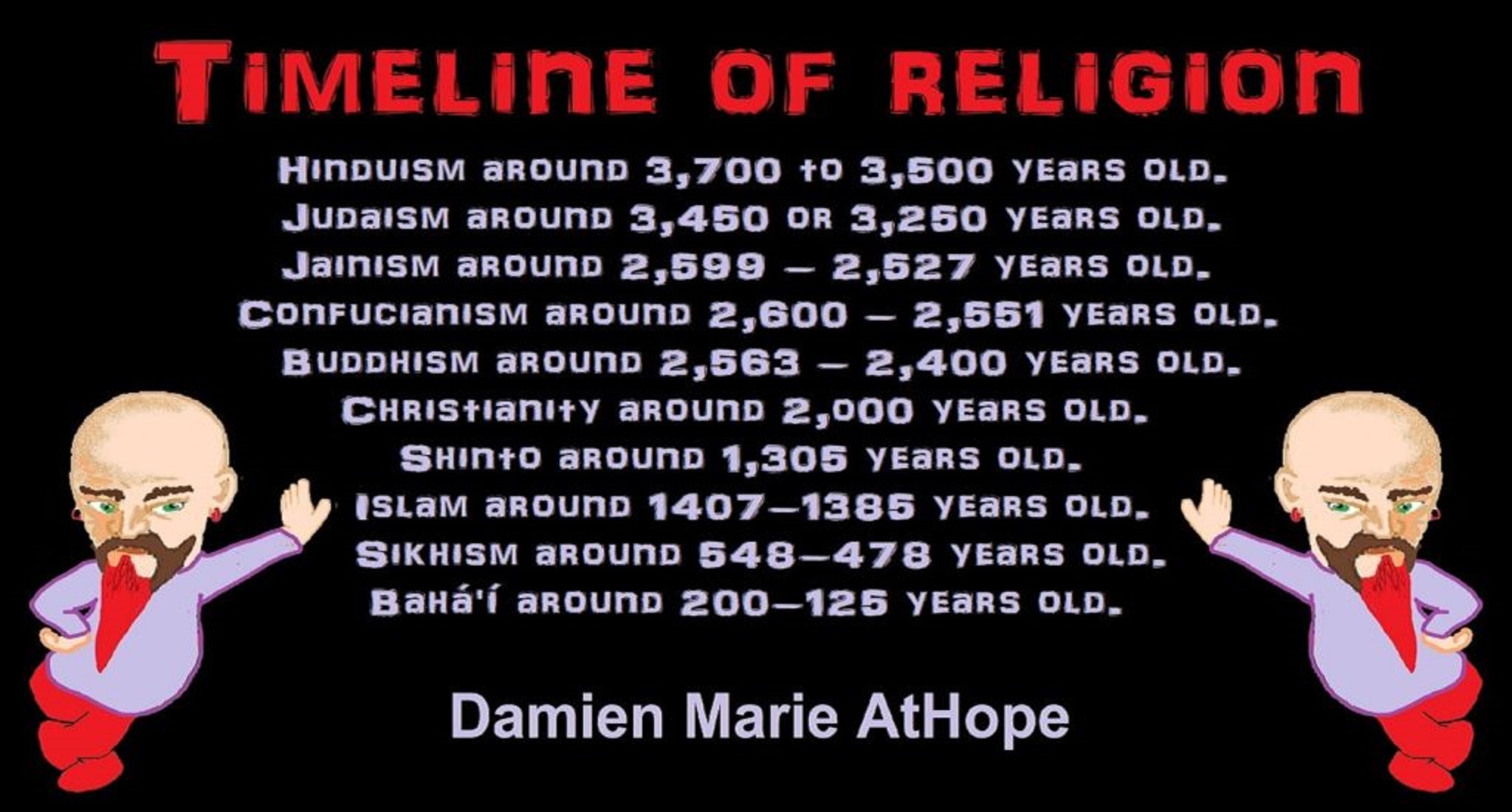
Hinduism around 3,700 to 3,500 years old. ref
Judaism around 3,450 or 3,250 years old. (The first writing in the bible was “Paleo-Hebrew” dated to around 3,000 years ago Khirbet Qeiyafa is the site of an ancient fortress city overlooking the Elah Valley. And many believe the religious Jewish texts were completed around 2,500) ref, ref
Judaism is around 3,450 or 3,250 years old. (“Paleo-Hebrew” 3,000 years ago and Torah 2,500 years ago)
“Judaism is an Abrahamic, its roots as an organized religion in the Middle East during the Bronze Age. Some scholars argue that modern Judaism evolved from Yahwism, the religion of ancient Israel and Judah, by the late 6th century BCE, and is thus considered to be one of the oldest monotheistic religions.” ref
“Yahwism is the name given by modern scholars to the religion of ancient Israel, essentially polytheistic, with a plethora of gods and goddesses. Heading the pantheon was Yahweh, the national god of the Israelite kingdoms of Israel and Judah, with his consort, the goddess Asherah; below them were second-tier gods and goddesses such as Baal, Shamash, Yarikh, Mot, and Astarte, all of whom had their own priests and prophets and numbered royalty among their devotees, and a third and fourth tier of minor divine beings, including the mal’ak, the messengers of the higher gods, who in later times became the angels of Judaism, Christianity and Islam. Yahweh, however, was not the ‘original’ god of Israel “Isra-El”; it is El, the head of the Canaanite pantheon, whose name forms the basis of the name “Israel”, and none of the Old Testament patriarchs, the tribes of Israel, the Judges, or the earliest monarchs, have a Yahwistic theophoric name (i.e., one incorporating the name of Yahweh).” ref
“El is a Northwest Semitic word meaning “god” or “deity“, or referring (as a proper name) to any one of multiple major ancient Near Eastern deities. A rarer form, ‘ila, represents the predicate form in Old Akkadian and in Amorite. The word is derived from the Proto-Semitic *ʔil-, meaning “god”. Specific deities known as ‘El or ‘Il include the supreme god of the ancient Canaanite religion and the supreme god of East Semitic speakers in Mesopotamia’s Early Dynastic Period. ʼĒl is listed at the head of many pantheons. In some Canaanite and Ugaritic sources, ʼĒl played a role as father of the gods, of creation, or both. For example, in the Ugaritic texts, ʾil mlk is understood to mean “ʼĒl the King” but ʾil hd as “the god Hadad“. The Semitic root ʾlh (Arabic ʾilāh, Aramaic ʾAlāh, ʾElāh, Hebrew ʾelōah) may be ʾl with a parasitic h, and ʾl may be an abbreviated form of ʾlh. In Ugaritic the plural form meaning “gods” is ʾilhm, equivalent to Hebrew ʾelōhîm “powers”. In the Hebrew texts this word is interpreted as being semantically singular for “god” by biblical commentators. However the documentary hypothesis for the Old Testament (corresponds to the Jewish Torah) developed originally in the 1870s, identifies these that different authors – the Jahwist, Elohist, Deuteronomist, and the Priestly source – were responsible for editing stories from a polytheistic religion into those of a monotheistic religion. Inconsistencies that arise between monotheism and polytheism in the texts are reflective of this hypothesis.” ref
Jainism around 2,599 – 2,527 years old. ref
Confucianism around 2,600 – 2,551 years old. ref
Buddhism around 2,563/2,480 – 2,483/2,400 years old. ref
Christianity around 2,o00 years old. ref
Shinto around 1,305 years old. ref
Islam around 1407–1385 years old. ref

Knowledge to Ponder:
Stars/Astrology:
- Possibly, around 30,000 years ago (in simpler form) to 6,000 years ago, Stars/Astrology are connected to Ancestors, Spirit Animals, and Deities.
- The star also seems to be a possible proto-star for Star of Ishtar, Star of Inanna, or Star of Venus.
- Around 7,000 to 6,000 years ago, Star Constellations/Astrology have connections to the “Kurgan phenomenon” of below-ground “mound” stone/wood burial structures and “Dolmen phenomenon” of above-ground stone burial structures.
- Around 6,500–5,800 years ago, The Northern Levant migrations into Jordon and Israel in the Southern Levant brought new cultural and religious transfer from Turkey and Iran.
- “The Ghassulian Star,” a mysterious 6,000-year-old mural from Jordan may have connections to the European paganstic kurgan/dolmens phenomenon.
“Astrology is a range of divinatory practices, recognized as pseudoscientific since the 18th century, that claim to discern information about human affairs and terrestrial events by studying the apparent positions of celestial objects. Different cultures have employed forms of astrology since at least the 2nd millennium BCE, these practices having originated in calendrical systems used to predict seasonal shifts and to interpret celestial cycles as signs of divine communications. Most, if not all, cultures have attached importance to what they observed in the sky, and some—such as the Hindus, Chinese, and the Maya—developed elaborate systems for predicting terrestrial events from celestial observations. Western astrology, one of the oldest astrological systems still in use, can trace its roots to 19th–17th century BCE Mesopotamia, from where it spread to Ancient Greece, Rome, the Islamicate world and eventually Central and Western Europe. Contemporary Western astrology is often associated with systems of horoscopes that purport to explain aspects of a person’s personality and predict significant events in their lives based on the positions of celestial objects; the majority of professional astrologers rely on such systems.” ref
Around 5,500 years ago, Science evolves, The first evidence of science was 5,500 years ago and was demonstrated by a body of empirical, theoretical, and practical knowledge about the natural world. ref
Around 5,000 years ago, Origin of Logics is a Naturalistic Observation (principles of valid reasoning, inference, & demonstration) ref
Around 4,150 to 4,000 years ago: The earliest surviving versions of the Sumerian Epic of Gilgamesh, which was originally titled “He who Saw the Deep” (Sha naqba īmuru) or “Surpassing All Other Kings” (Shūtur eli sharrī) were written. ref
Hinduism:
- 3,700 years ago or so, the oldest of the Hindu Vedas (scriptures), the Rig Veda was composed.
- 3,500 years ago or so, the Vedic Age began in India after the collapse of the Indus Valley Civilization.
Judaism:
- around 3,000 years ago, the first writing in the bible was “Paleo-Hebrew”
- around 2,500 years ago, many believe the religious Jewish texts were completed
Myths: The bible inspired religion is not just one religion or one myth but a grouping of several religions and myths
- Around 3,450 or 3,250 years ago, according to legend, is the traditionally accepted period in which the Israelite lawgiver, Moses, provided the Ten Commandments.
- Around 2,500 to 2,400 years ago, a collection of ancient religious writings by the Israelites based primarily upon the Hebrew Bible, Tanakh, or Old Testament is the first part of Christianity’s bible.
- Around 2,400 years ago, the most accepted hypothesis is that the canon was formed in stages, first the Pentateuch (Torah).
- Around 2,140 to 2,116 years ago, the Prophets was written during the Hasmonean dynasty, and finally the remaining books.
- Christians traditionally divide the Old Testament into four sections:
- The first five books or Pentateuch (Torah).
- The proposed history books telling the history of the Israelites from their conquest of Canaan to their defeat and exile in Babylon.
- The poetic and proposed “Wisdom books” dealing, in various forms, with questions of good and evil in the world.
- The books of the biblical prophets, warning of the consequences of turning away from God:
- Henotheism:
- Exodus 20:23 “You shall not make other gods besides Me (not saying there are no other gods just not to worship them); gods of silver or gods of gold, you shall not make for yourselves.”
- Polytheism:
- Judges 10:6 “Then the sons of Israel again did evil in the sight of the LORD, served the Baals and the Ashtaroth, the gods of Aram, the gods of Sidon, the gods of Moab, the gods of the sons of Ammon, and the gods of the Philistines; thus they forsook the LORD and did not serve Him.”
- 1 Corinthians 8:5 “For even if there are so-called gods whether in heaven or on earth, as indeed there are many gods and many lords.”
- Monotheism:
- Isaiah 43:10 “You are my witnesses,” declares the LORD, “and my servant whom I have chosen, so that you may know and believe me and understand that I am he. Before me no god was formed, nor will there be one after me.
Around 2,570 to 2,270 Years Ago, there is a confirmation of atheistic doubting as well as atheistic thinking, mainly by Greek philosophers. However, doubting gods is likely as old as the invention of gods and should destroy the thinking that belief in god(s) is the “default belief”. The Greek word is apistos (a “not” and pistos “faithful,”), thus not faithful or faithless because one is unpersuaded and unconvinced by a god(s) claim. Short Definition: unbelieving, unbeliever, or unbelief.

Expressions of Atheistic Thinking:
- Around 2,600 years ago, Ajita Kesakambali, ancient Indian philosopher, who is the first known proponent of Indian materialism. ref
- Around 2,535 to 2,475 years ago, Heraclitus, Greek pre-Socratic philosopher, a native of the Greek city Ephesus, Ionia, on the coast of Anatolia, also known as Asia Minor or modern Turkey. ref
- Around 2,500 to 2,400 years ago, according to The Story of Civilization book series certain African pygmy tribes have no identifiable gods, spirits, or religious beliefs or rituals, and even what burials accrue are without ceremony. ref
- Around 2,490 to 2,430 years ago, Empedocles, Greek pre-Socratic philosopher and a citizen of Agrigentum, a Greek city in Sicily. ref
- Around 2,460 to 2,370 years ago, Democritus, Greek pre-Socratic philosopher considered to be the “father of modern science” possibly had some disbelief amounting to atheism. ref
- Around 2,399 years ago or so, Socrates, a famous Greek philosopher was tried for sinfulness by teaching doubt of state gods. ref
- Around 2,341 to 2,270 years ago, Epicurus, a Greek philosopher known for composing atheistic critics and famously stated, “Is God willing to prevent evil, but not able? Then he is not omnipotent. Is he able, but not willing? Then he is malevolent. Is he both able and willing? Then whence cometh evil? Is he neither able nor willing? Then why call him god?” ref
This last expression by Epicurus, seems to be an expression of Axiological Atheism. To understand and utilize value or actually possess “Value Conscious/Consciousness” to both give a strong moral “axiological” argument (the problem of evil) as well as use it to fortify humanism and positive ethical persuasion of human helping and care responsibilities. Because value-blindness gives rise to sociopathic/psychopathic evil.

While hallucinogens are associated with shamanism, it is alcohol that is associated with paganism.
The Atheist-Humanist-Leftist Revolutionaries Shows in the prehistory series:
Show two: Pre-animism 300,000 years old and animism 100,000 years old: related to “Anarchism and Socialism”
Show tree: Totemism 50,000 years old: related to “Anarchism and Socialism”
Show four: Shamanism 30,000 years old: related to “Anarchism and Socialism”
Show five: Paganism 12,000 years old: related to “Anarchism and Socialism”
Show six: Emergence of hierarchy, sexism, slavery, and the new male god dominance: Paganism 7,000-5,000 years old: related to “Anarchism and Socialism” (Capitalism) (World War 0) Elite and their slaves!
Prehistory: related to “Anarchism and Socialism” the division of labor, power, rights, and recourses: VIDEO
Pre-animism 300,000 years old and animism 100,000 years old: related to “Anarchism and Socialism”: VIDEO
Totemism 50,000 years old: related to “Anarchism and Socialism”: VIDEO
Shamanism 30,000 years old: related to “Anarchism and Socialism”: VIDEO
Paganism 12,000 years old: related to “Anarchism and Socialism” (Pre-Capitalism): VIDEO
Paganism 7,000-5,000 years old: related to “Anarchism and Socialism” (Capitalism) (World War 0) Elite and their slaves: VIEDO
Paganism 5,000 years old: progressed organized religion and the state: related to “Anarchism and Socialism” (Kings and the Rise of the State): VIEDO
Paganism 4,000 years old: related to “Anarchism and Socialism” (First Moralistic gods, then the Origin time of Monotheism): VIEDO
I do not hate simply because I challenge and expose myths or lies any more than others being thought of as loving simply because of the protection and hiding from challenge their favored myths or lies.
The truth is best championed in the sunlight of challenge.
An archaeologist once said to me “Damien religion and culture are very different”
My response, So are you saying that was always that way, such as would you say Native Americans’ cultures are separate from their religions? And do you think it always was the way you believe?
I had said that religion was a cultural product. That is still how I see it and there are other archaeologists that think close to me as well. Gods too are the myths of cultures that did not understand science or the world around them, seeing magic/supernatural everywhere.
I personally think there is a goddess and not enough evidence to support a male god at Çatalhöyük but if there was both a male and female god and goddess then I know the kind of gods they were like Proto-Indo-European mythology.
This series idea was addressed in, Anarchist Teaching as Free Public Education or Free Education in the Public: VIDEO
Our 12 video series: Organized Oppression: Mesopotamian State Force and the Politics of power (9,000-4,000 years ago), is adapted from: The Complete and Concise History of the Sumerians and Early Bronze Age Mesopotamia (7000-2000 BC): https://www.youtube.com/watch?v=szFjxmY7jQA by “History with Cy“
Show #1: Mesopotamian State Force and the Politics of Power (Samarra, Halaf, Ubaid)
Show #2: Mesopotamian State Force and the Politics of Power
Show #3: Mesopotamian State Force and the Politics of Power (Uruk and the First Cities)
Show #4: Mesopotamian State Force and the Politics of Power (First Kings)
Show #5: Mesopotamian State Force and the Politics of Power (Early Dynastic Period)
Show #6: Mesopotamian State Force and the Politics of Power
Show #7: Mesopotamian State Force and the Politics of Power (Sargon and Akkadian Rule)
Show #9: Mesopotamian State Force and the Politics of Power (Gudea of Lagash and Utu-hegal)
Show #12: Mesopotamian State Force and the Politics of Power (Aftermath and Legacy of Sumer)

The “Atheist-Humanist-Leftist Revolutionaries”
Cory Johnston ☭ Ⓐ Atheist Leftist @Skepticallefty & I (Damien Marie AtHope) @AthopeMarie (my YouTube & related blog) are working jointly in atheist, antitheist, antireligionist, antifascist, anarchist, socialist, and humanist endeavors in our videos together, generally, every other Saturday.
Why Does Power Bring Responsibility?
Think, how often is it the powerless that start wars, oppress others, or commit genocide? So, I guess the question is to us all, to ask, how can power not carry responsibility in a humanity concept? I know I see the deep ethical responsibility that if there is power their must be a humanistic responsibility of ethical and empathic stewardship of that power. Will I be brave enough to be kind? Will I possess enough courage to be compassionate? Will my valor reach its height of empathy? I as everyone, earns our justified respect by our actions, that are good, ethical, just, protecting, and kind. Do I have enough self-respect to put my love for humanity’s flushing, over being brought down by some of its bad actors? May we all be the ones doing good actions in the world, to help human flourishing.
I create the world I want to live in, striving for flourishing. Which is not a place but a positive potential involvement and promotion; a life of humanist goal precision. To master oneself, also means mastering positive prosocial behaviors needed for human flourishing. I may have lost a god myth as an atheist, but I am happy to tell you, my friend, it is exactly because of that, leaving the mental terrorizer, god belief, that I truly regained my connected ethical as well as kind humanity.
Cory and I will talk about prehistory and theism, addressing the relevance to atheism, anarchism, and socialism.
At the same time as the rise of the male god, 7,000 years ago, there was also the very time there was the rise of violence, war, and clans to kingdoms, then empires, then states. It is all connected back to 7,000 years ago, and it moved across the world.
Cory Johnston: https://damienmarieathope.com/2021/04/cory-johnston-mind-of-a-skeptical-leftist/?v=32aec8db952d
The Mind of a Skeptical Leftist (YouTube)
Cory Johnston: Mind of a Skeptical Leftist @Skepticallefty
The Mind of a Skeptical Leftist By Cory Johnston: “Promoting critical thinking, social justice, and left-wing politics by covering current events and talking to a variety of people. Cory Johnston has been thoughtfully talking to people and attempting to promote critical thinking, social justice, and left-wing politics.” http://anchor.fm/skepticalleft
Cory needs our support. We rise by helping each other.
Cory Johnston ☭ Ⓐ @Skepticallefty Evidence-based atheist leftist (he/him) Producer, host, and co-host of 4 podcasts @skeptarchy @skpoliticspod and @AthopeMarie
Damien Marie AtHope (“At Hope”) Axiological Atheist, Anti-theist, Anti-religionist, Secular Humanist. Rationalist, Writer, Artist, Poet, Philosopher, Advocate, Activist, Psychology, and Armchair Archaeology/Anthropology/Historian.
Damien is interested in: Freedom, Liberty, Justice, Equality, Ethics, Humanism, Science, Atheism, Antiteism, Antireligionism, Ignosticism, Left-Libertarianism, Anarchism, Socialism, Mutualism, Axiology, Metaphysics, LGBTQI, Philosophy, Advocacy, Activism, Mental Health, Psychology, Archaeology, Social Work, Sexual Rights, Marriage Rights, Woman’s Rights, Gender Rights, Child Rights, Secular Rights, Race Equality, Ageism/Disability Equality, Etc. And a far-leftist, “Anarcho-Humanist.”
I am not a good fit in the atheist movement that is mostly pro-capitalist, I am anti-capitalist. Mostly pro-skeptic, I am a rationalist not valuing skepticism. Mostly pro-agnostic, I am anti-agnostic. Mostly limited to anti-Abrahamic religions, I am an anti-religionist.
To me, the “male god” seems to have either emerged or become prominent around 7,000 years ago, whereas the now favored monotheism “male god” is more like 4,000 years ago or so. To me, the “female goddess” seems to have either emerged or become prominent around 11,000-10,000 years ago or so, losing the majority of its once prominence around 2,000 years ago due largely to the now favored monotheism “male god” that grow in prominence after 4,000 years ago or so.
My Thought on the Evolution of Gods?
Animal protector deities from old totems/spirit animal beliefs come first to me, 13,000/12,000 years ago, then women as deities 11,000/10,000 years ago, then male gods around 7,000/8,000 years ago. Moralistic gods around 5,000/4,000 years ago, and monotheistic gods around 4,000/3,000 years ago.
To me, animal gods were likely first related to totemism animals around 13,000 to 12,000 years ago or older. Female as goddesses was next to me, 11,000 to 10,000 years ago or so with the emergence of agriculture. Then male gods come about 8,000 to 7,000 years ago with clan wars.

Damien Marie AtHope (Said as “At” “Hope”)/(Autodidact Polymath but not good at math):
Axiological Atheist, Anti-theist, Anti-religionist, Secular Humanist, Rationalist, Writer, Artist, Jeweler, Poet, “autodidact” Philosopher, schooled in Psychology, and “autodidact” Armchair Archaeology/Anthropology/Pre-Historian (Knowledgeable in the range of: 1 million to 5,000/4,000 years ago). I am an anarchist socialist politically. Reasons for or Types of Atheism
My Website, My Blog, & Short-writing or Quotes, My YouTube, Twitter: @AthopeMarie, and My Email: damien.marie.athope@gmail.com

